Arizona Documents
Quitclaim Deed
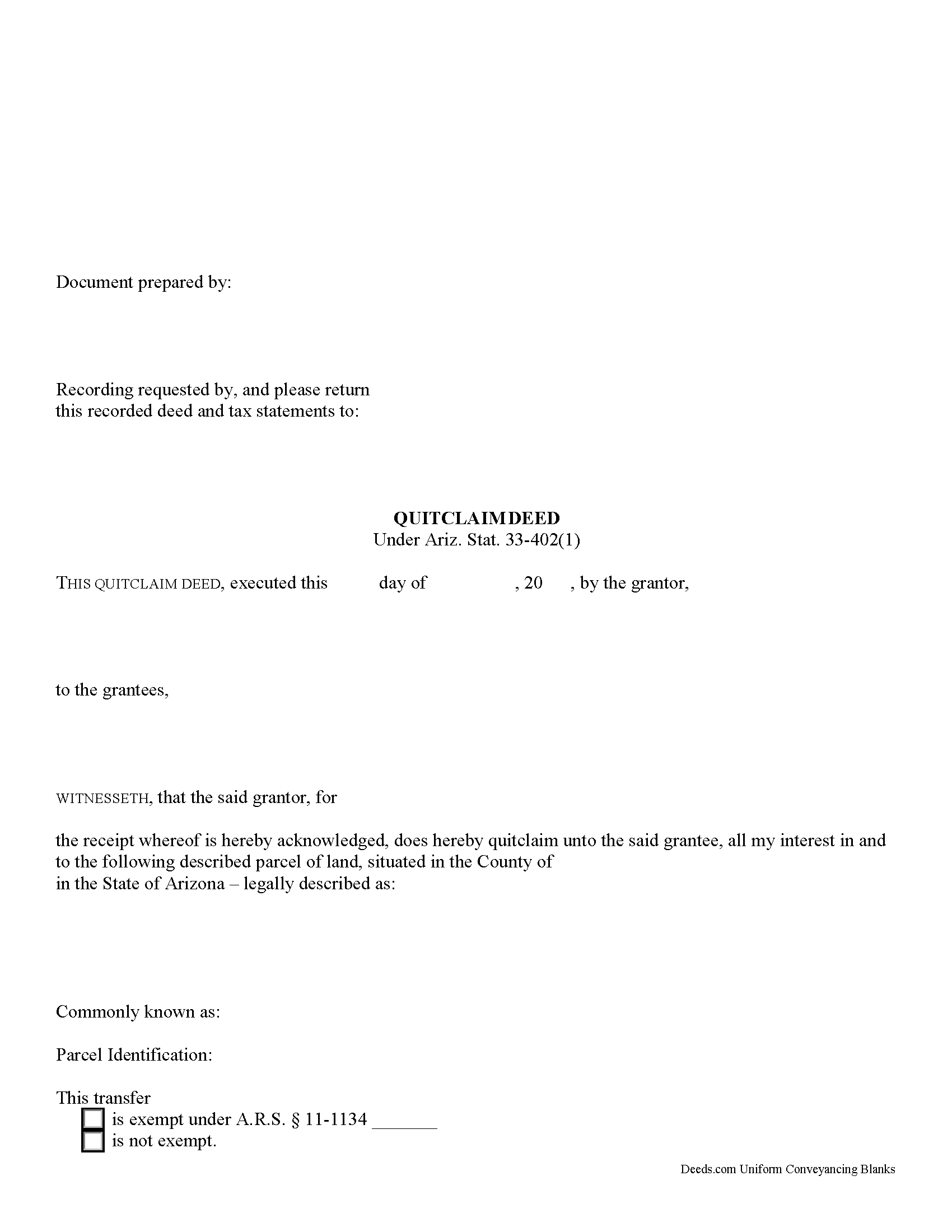
Quitclaim deeds are documents used to transfer the owner's interest (if any) in real property to someone else, with no warranties of title. The transfer may or may not include consideration (something of value, usually money). They are generally used to clear clouded titles, to settle boundary disputes between neighbors, or to make gifts of real property, and include no warranties of title for the new owners. These deeds are also appropriate for situations like divorce, where the idea is simply removing one party's name from a deed, or relinquishing marital rights in real estate.
For Arizona quitclaim deeds under Section 33-402(1) to be valid, they must conform to specific statutory requirements set forth by 33-401, as well as other relevant state and local standards for recording.
The quitclaim deed must be in writing and contain a heading that identifies the nature of the document. Original forms are preferred. LEGIBLE certified copies are also acceptable, but all signatures must be original. The grantor or an authorized agent must sign the deed in front of an officer certified to take acknowledgments. If the deed marks a change in ownership of real property, provide the pr... More Information about the Arizona Quitclaim Deed
Quitclaim Deed Condominium
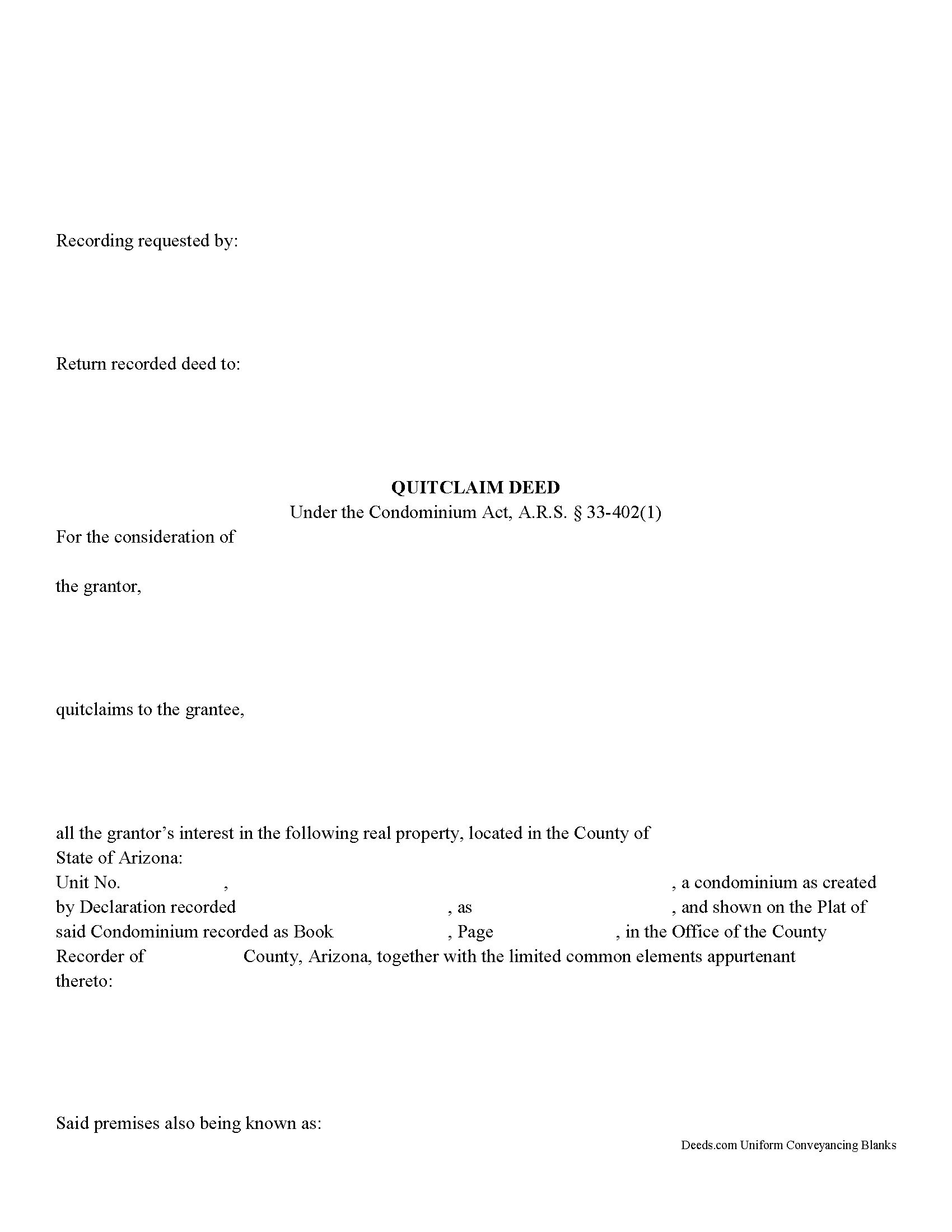
The Condominium Act is codified in Arizona at ARS 33-1201, et seq. A condominium is a piece of real estate, portions (units) of which are reserved for separate ownership, with the remainder designated for common ownership solely by owners of the separate units (33-1202(10)).
A conveyance of a condominium unit typically includes the unit and common elements appurtenant to the unit. "Common elements" are the portions of a condominium other than the units, such as entryways, hallways, walls, and gardens (33-1212(7)). The declaration establishing the condominium, recorded in the real property records, designates the allocated interest of each unit, meaning the undivided interest in the common elements, the common expense liability, and votes in the association allocated to each unit (33-1202(2)).
Conveyances of condominium units follow the same guidelines for conveyances of real property under Title 33 of the Arizona Revised Statutes. As with any other transfer of real property, conveyance of a unit requires the execution of a deed.
A quitclaim deed is a statutory form under ARS 33-402(1) that transfers the grantor's interest, if any, in the described property, with no warran... More Information about the Arizona Quitclaim Deed Condominium
Gift Deed
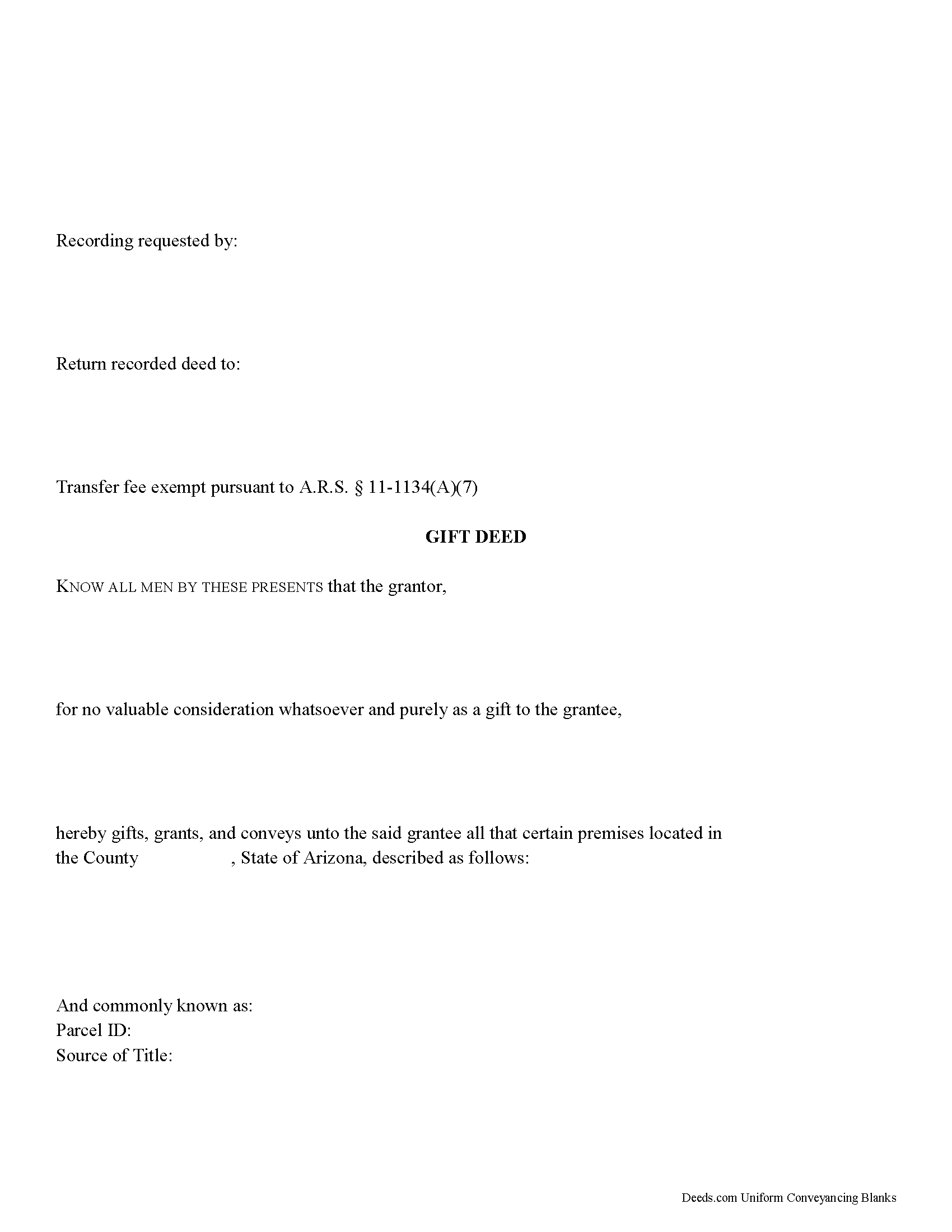
Gift deeds convey title to real property from one party to another with no exchange of consideration, monetary or otherwise. Often used to transfer property between family members or to gift property as a charitable act or donation, these conveyances occur during the grantor's lifetime.
Gift deeds must contain language that explicitly states that no consideration is expected or required. Ambiguous language, or references to any type of consideration, can make the gift deed contestable in court.
Arizona property owners can transfer real estate with implied covenants of title. By including the words "grant" or "convey," the grantor (seller) guarantees that he or she has not transferred title to the property to anyone other than the grantee (buyer), and that, at the time of legal transfer of property, the estate is free from any impediments to the transfer. Implied covenants carry the same legal implications as if they were explicitly stated (A.R.S. Section 33-435).
A lawful gift deed includes the grantor's full name, marital status, and mailing address, as well as the grantee's full name, marital status, mailing address, and vesting. Vesting describes how the grantee holds ... More Information about the Arizona Gift Deed
Warranty Deed
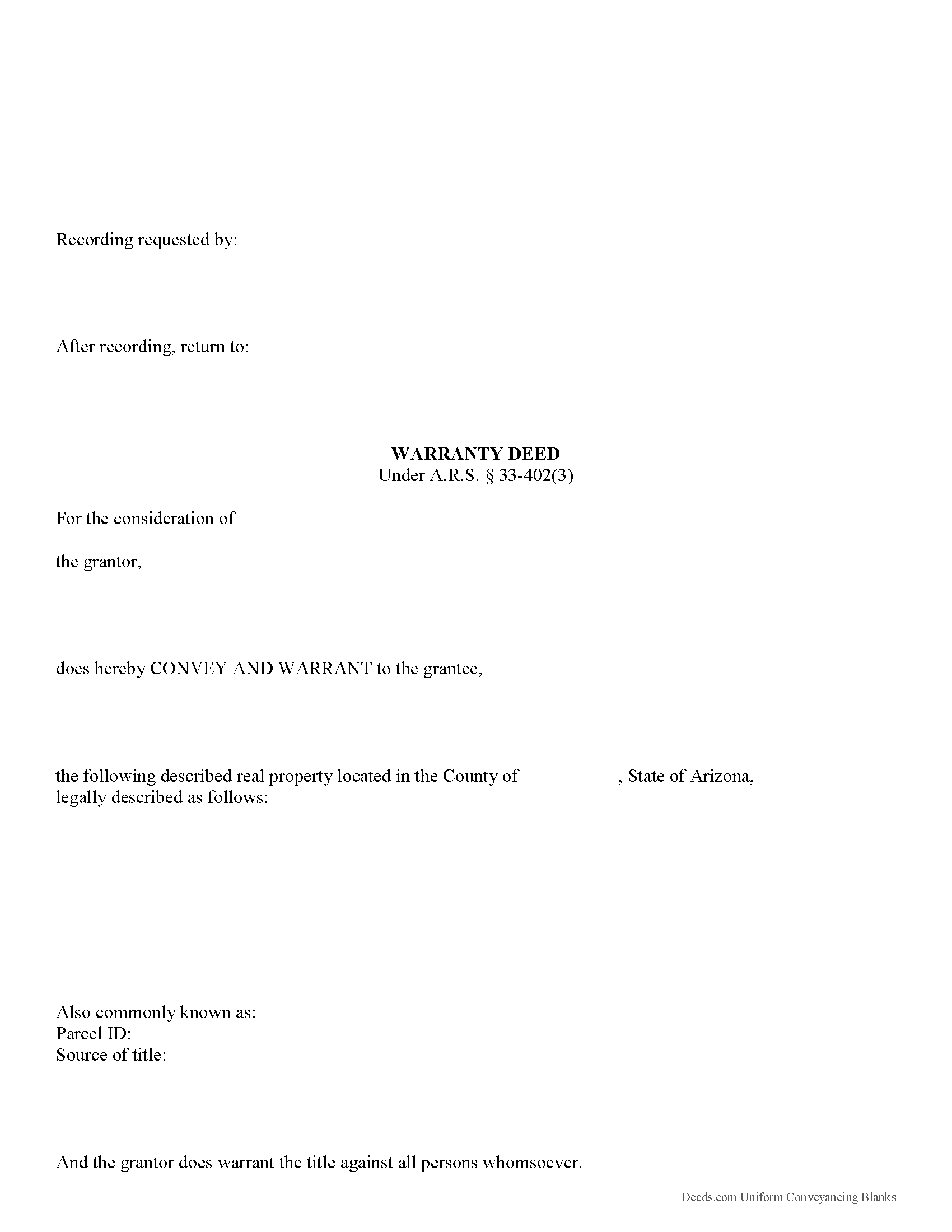
No estate of inheritance or freehold in lands or tenements can be conveyed unless it is done so by a deed in writing, subscribed and delivered by the party disposing of the estate, or by that party's agent authorized in writing (33-401). In Arizona, warranty deeds are used more than special warranty deeds are used.
The statutory form for a conveyance is provided in 33-402 of the Arizona Revised Statutes. A warranty deed, by the use of the word "convey," contains the following implied covenants: (1) That previous to the time of execution of the conveyance, the grantor has not conveyed the same estate or any right, title, or interest therein to any person other than the grantee and (2) That at the time of execution of the conveyance, the estate is free from encumbrances (33-435). Warranty deeds are similar to general conveyances, but provide further assurances through the use of the phrase "I hereby convey and warrant the title against all persons whomsoever" (33-402).
A warranty deed must be signed by the grantor and must be duly acknowledged before an officer authorized to take acknowledgements in Arizona or in another state (33-401b). If acknowledged out of state, it can b... More Information about the Arizona Warranty Deed
Warranty Deed Condominium
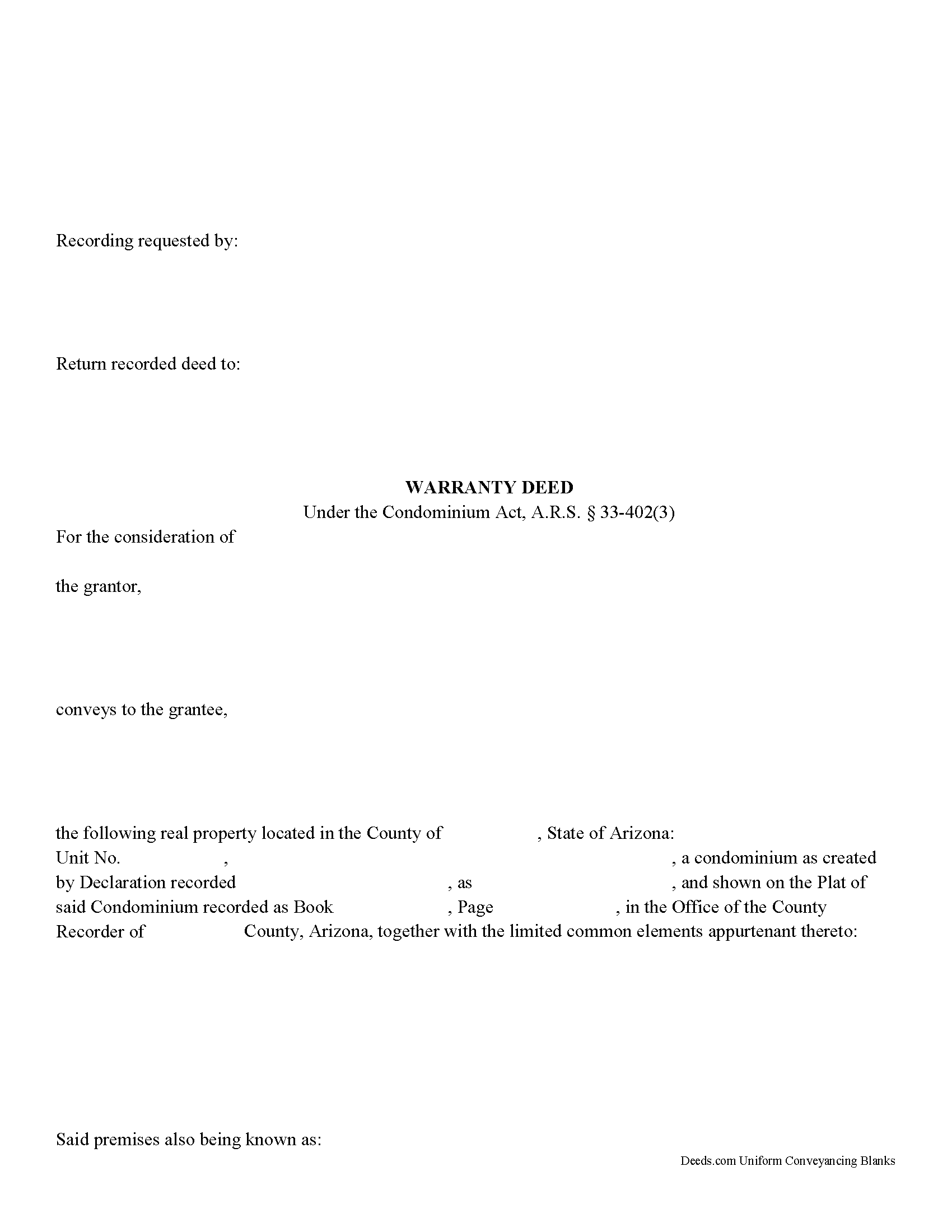
The Condominium Act is codified in Arizona at ARS 33-1201, et seq. A condominium is a piece of real estate, portions (units) of which are reserved for separate ownership, with the remainder designated for common ownership solely by owners of the separate units (33-1202(10)).
A conveyance of a condominium unit typically includes the unit and common elements appurtenant to the unit. "Common elements" are the portions of a condominium other than the units, such as entryways, hallways, walls, and gardens (33-1212(7)). The declaration establishing the condominium, recorded in the real property records, designates the allocated interest of each unit, meaning the undivided interest in the common elements, the common expense liability, and votes in the association allocated to each unit (33-1202(2)).
Conveyances of condominium units follow the same guidelines for conveyances of real property under Title 33 of the Arizona Revised Statutes. As with any other transfer of real property, conveyance of a unit requires the execution of a deed.
A warranty deed is a statutory form under ARS 33-402(3). In addition to the covenants of a grant deed (that the property has not been previously ... More Information about the Arizona Warranty Deed Condominium
Special Warranty Deed
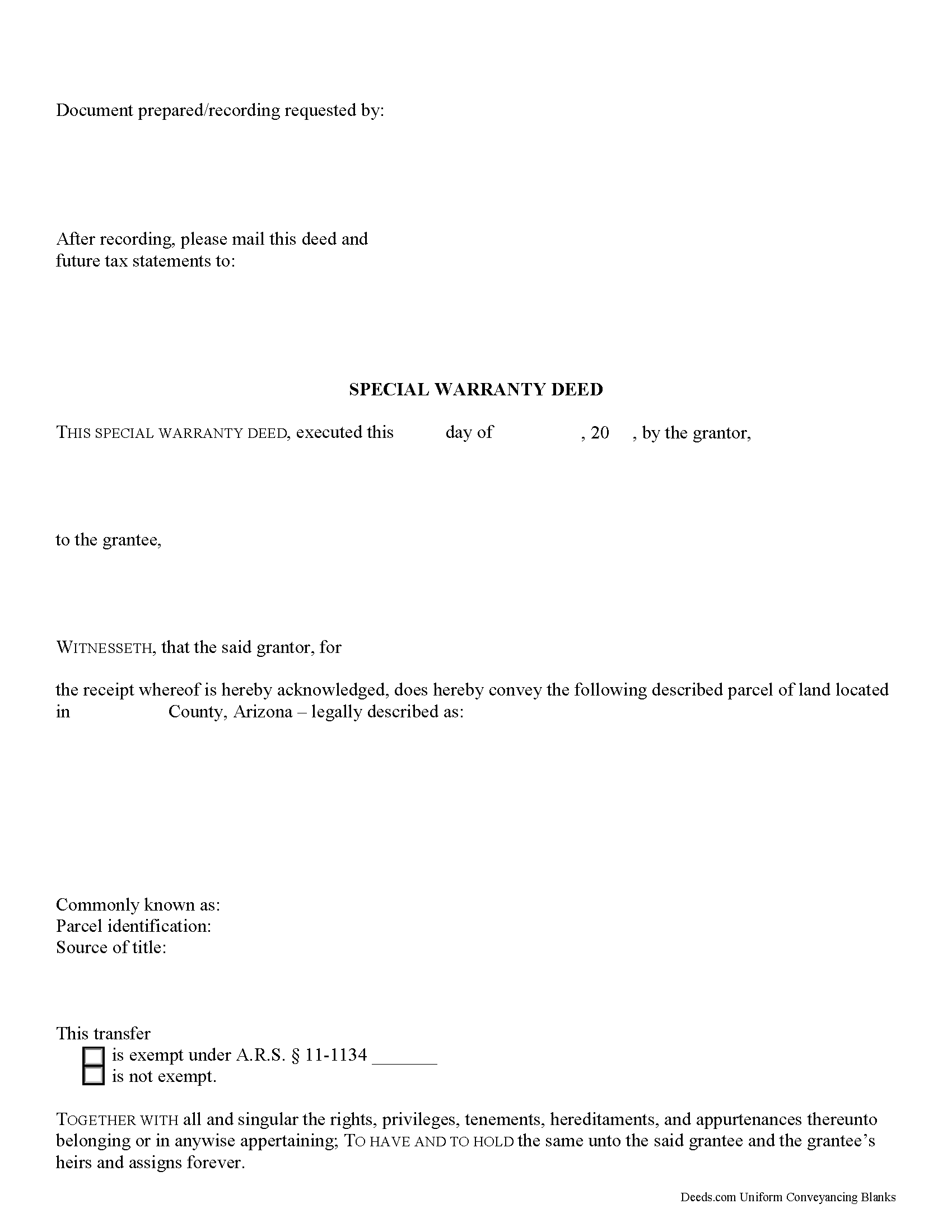
A valid special warranty deed in Arizona must conform to statutory requirements. A special warranty deed can be used in a real estate transaction when a grantor does not want to offer full covenants of warranty.
By the use of the words "grant" or "convey" in a real estate deed in Arizona, the following covenants are implied: (1) That previous to the time of execution of the conveyance, the grantor has not conveyed the same estate or any right, title, or interest therein to any person other than the grantee and (2) That at the time of execution of the conveyance, the estate is free from encumbrances (33-435). In a special warranty deed, the grantor warrants to defend the title only against the claims and demands of the grantor and those claiming by, through, or under the grantor.
To be eligible for recording, a special warranty deed must be signed by the grantor and must be duly acknowledged before an officer authorized to take acknowledgements in Arizona or in another state (33-401b). If acknowledged out of state, it can be done so before a notary public, a judge, clerk, or deputy clerk of a court of record, or any other person authorized to perform notarial acts in the sta... More Information about the Arizona Special Warranty Deed
Grant Deed
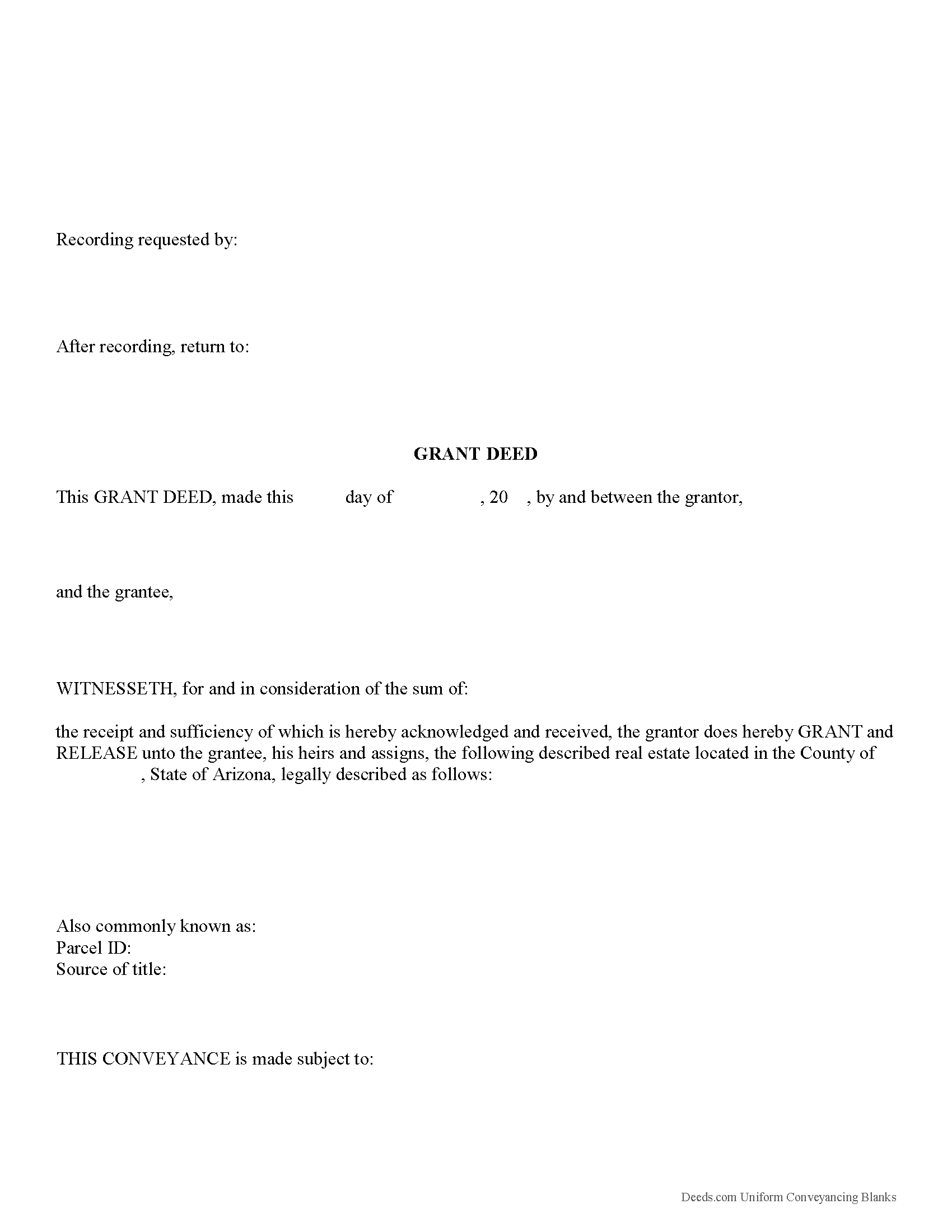
A conveyance of land in Arizona is made by a deed in writing, subscribed and delivered by the party granting the estate, or by the granting party's agent, authorized in writing (33-401). The grant deed is similar to a warranty deed but does not include additional guarantees.
An Arizona grant deed implies some of the usual covenants of title, but not all. When the words "grant" or "convey" are used in a real estate deed in Arizona, the following covenants, and none other, are implied, unless they are restrained by specific words in the conveyance: (1) That previous to the time of execution, the grantor has not conveyed the property to anyone other than the grantee and (2) that the estate is free from encumbrances at the time of execution (33-435). A grant deed in this state will pass the after-acquired title of the grantor, unless an exception is made in the deed.
Grant deeds must be signed by the grantor and duly acknowledged before an officer authorized to take acknowledgements. If acknowledgments are made in a state other than Arizona, they can be made before a notary public, a judge, clerk, or deputy clerk of a court of record, or any other person in the state authorized ... More Information about the Arizona Grant Deed
Grant Deed Condominium
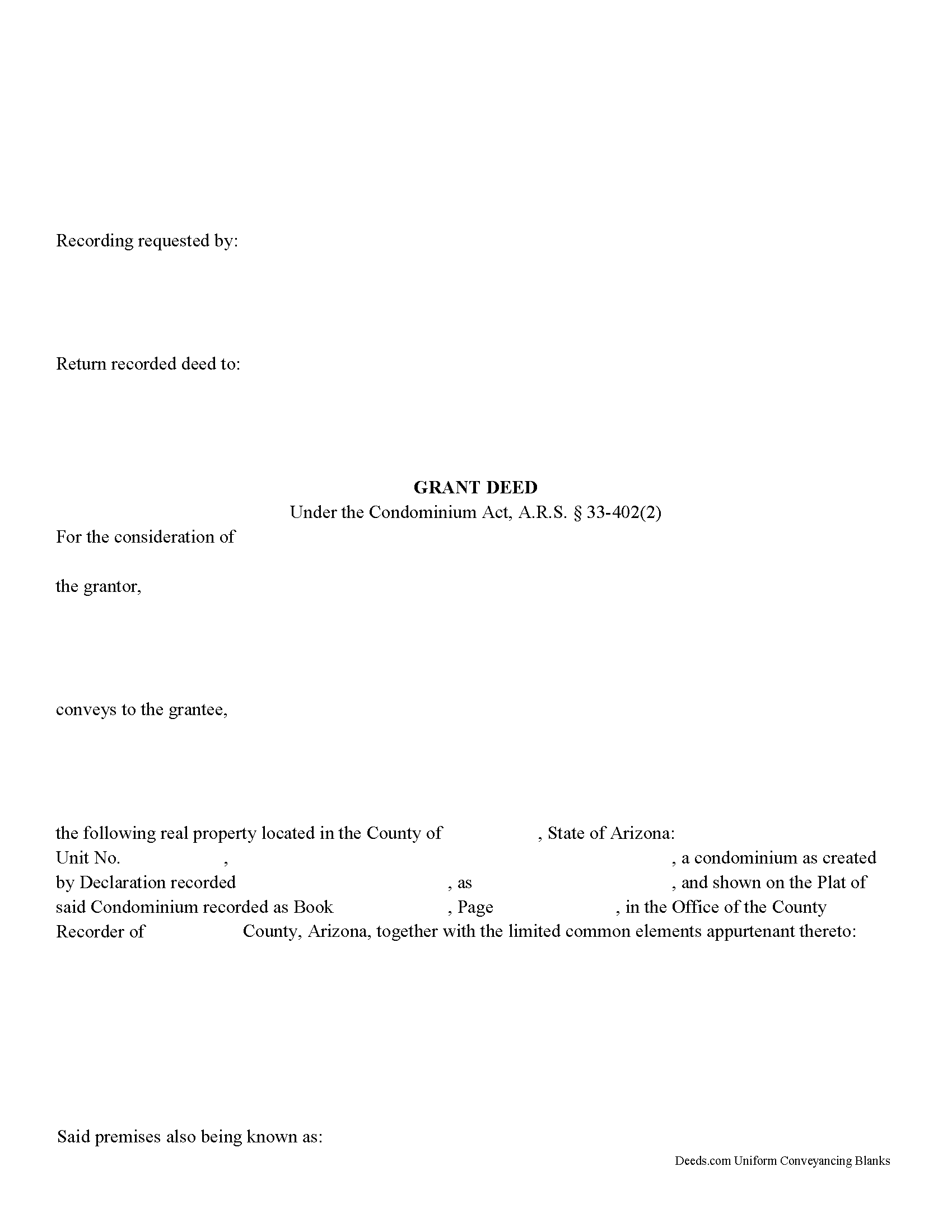
The Condominium Act is codified in Arizona at ARS 33-1201, et seq. A condominium is a piece of real estate, portions (units) of which are reserved for separate ownership, with the remainder designated for common ownership solely by owners of the separate units (33-1202(10)).
A conveyance of a condominium unit typically includes the unit and common elements appurtenant to the unit. "Common elements" are the portions of a condominium other than the units, such as entryways, hallways, walls, and gardens (33-1212(7)). The declaration establishing the condominium, recorded in the real property records, designates the allocated interest of each unit, meaning the undivided interest in the common elements, the common expense liability, and votes in the association allocated to each unit (33-1202(2)).
Conveyances of condominium units follow the same guidelines for conveyances of real property under Title 33 of the Arizona Revised Statutes. As with any other transfer of real property, conveyance of a unit requires the execution of a deed.
A grant deed is a statutory form under ARS 33-402(2). When containing the word "grant" or "convey," a grant deed transfers title with the implied... More Information about the Arizona Grant Deed Condominium
Correction Deed
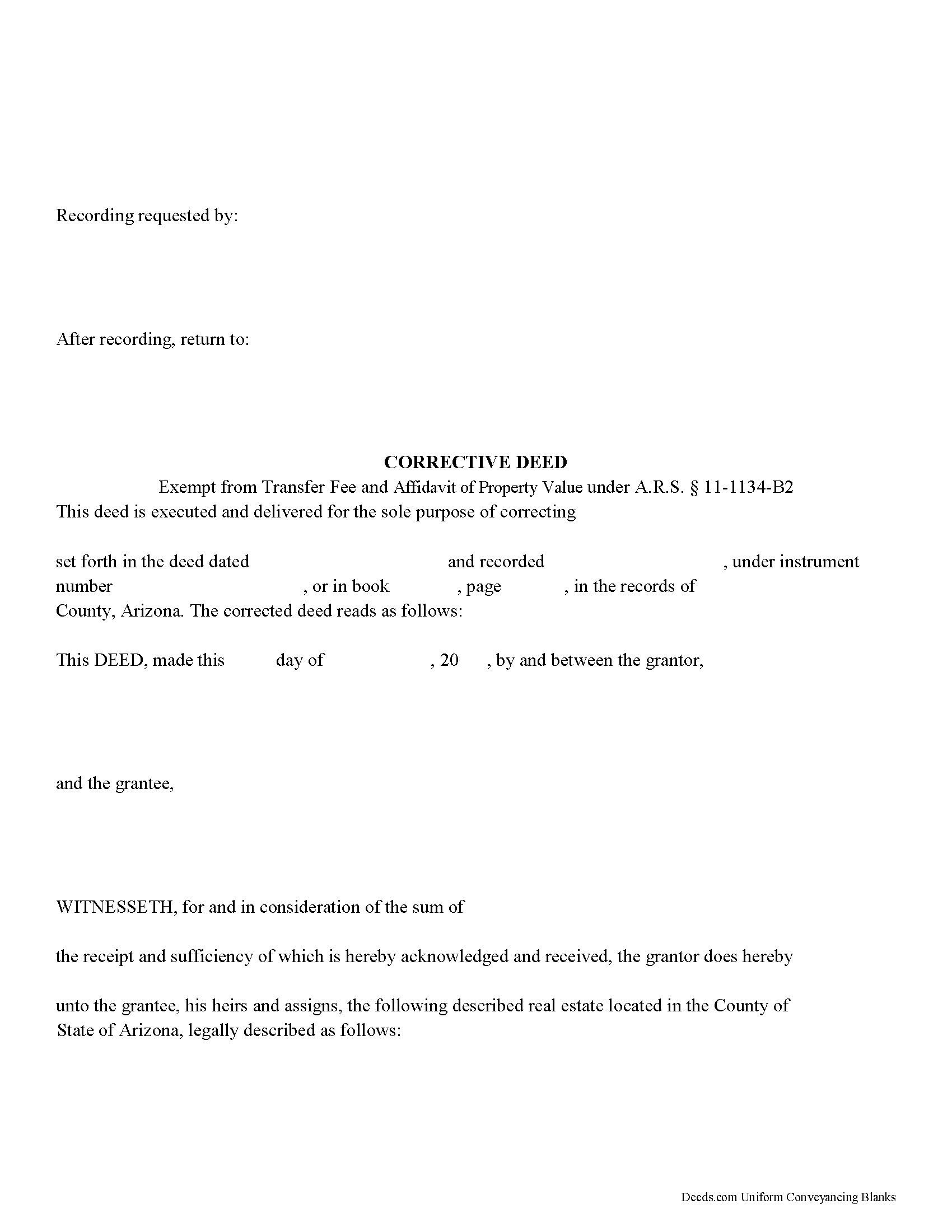
What happens when there is an error in your deed? What can you do to fix it? One option may be filing a corrective deed.
A corrective deed is an instrument used to correct a small error in a deed that has been recorded at an earlier date. Corrections can only be made to non-material errors, causing no actual change in the substance of the deed. Common mistakes include typographical errors in the legal description, misspelled names, accidentally omitted suffixes or middle initials, etc.
Major, or material, changes to the substance of the deed have a legal effect in how property is titled, and therefore require a new deed. Adding or removing a grantee, for example, or significant changes to the legal description, may all require a new deed of conveyance. When in doubt about the gravity of an error and whether a correction deed is the appropriate vehicle to address it, consult with a lawyer.
On the corrective deed, give the recording information from the previously filed document, then identify which section contains the error. Provide the correct details in the body of the deed. The corrective deed states the nature of the error and recites the date and recording informati... More Information about the Arizona Correction Deed
Easement Deed
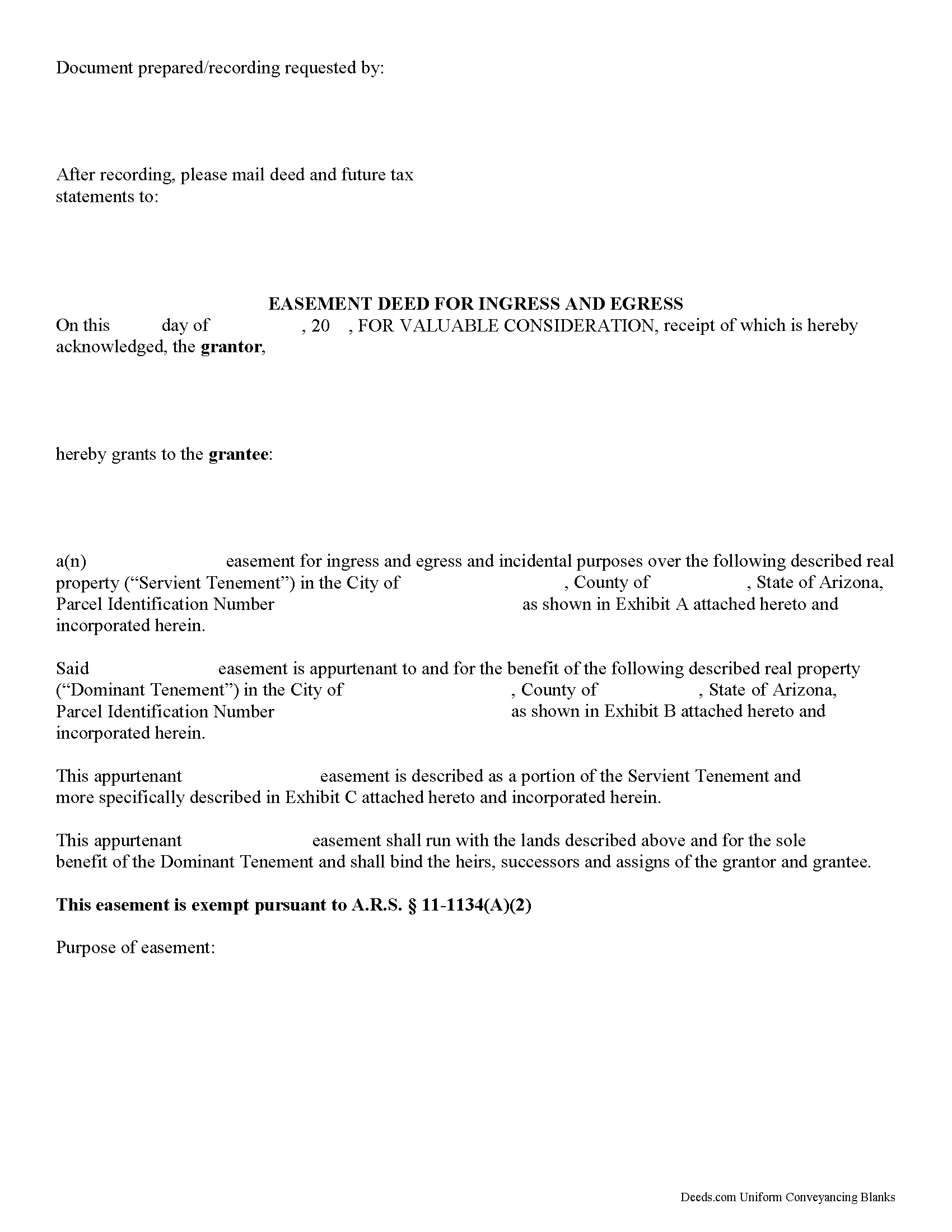
An easement, a non-possessory interest in someone's land, is created using the same formalities as a transfer of other interests in land. The property to which the easement pertains may be owned by a private person, a business entity, or a group of owners. Easements generally pass with the property.
One type of easement in Arizona, a conservation easement, is a non-possessory interest of a holder in real property imposing limitations or affirmative obligations for conservation purposes or to preserve the historical, architectural, archaeological, or cultural aspects of real property (33-271). Other types of easements include the right-of-way easement and the affirmative easement. An easement is created by conveyance in a deed with the easement type described in the first paragraph of the document.
As a conveyance of a real property interest, an easement in Arizona should be signed by the grantor, duly acknowledged, and then recorded according to law. The easement should be recorded in the county where the property which is the subject of the easement is located. The act of recording provides constructive notice of the contents to subsequent purchasers or encumbrance holders... More Information about the Arizona Easement Deed
Termination, Cancellation of Easement / Right of Way
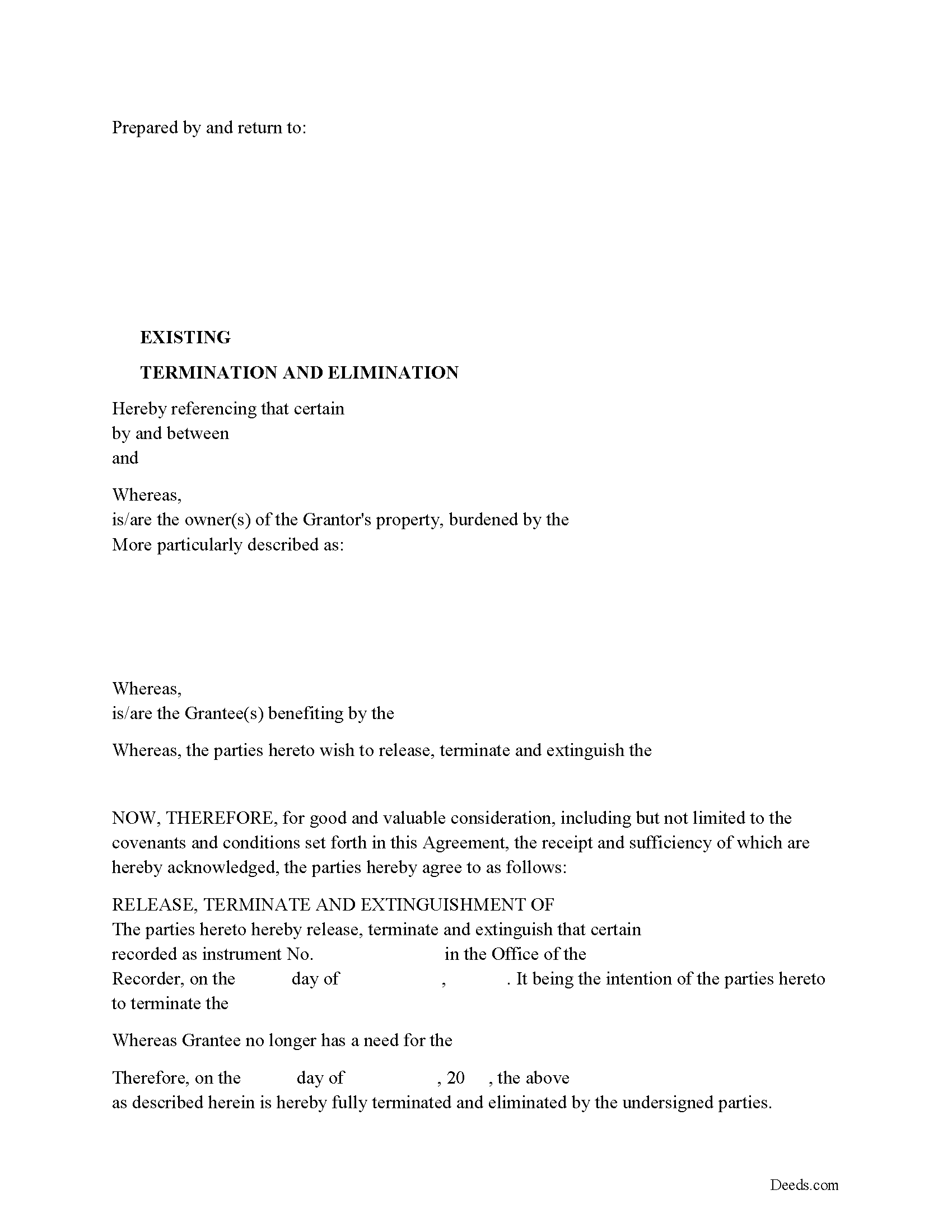
Use this form to release, terminate, extinguish a previously recorded document that involves access to and from a property.
Documents such as:
1. Easement Deeds or Agreements (An easement is a non-possessory interest in land, granting the right to use someone else's property for a specific purpose, like a driveway or utility line)
2. Access Roads
3. Right of Ways
4. Utility Easements (Power, Gas, Water, Sewer, Etc.)
5. Drainage Easements
This document allows the owner of the land, burdened by the access and the party that benefits from the access, to sign an agreement releasing the property from such access, ... More Information about the Arizona Termination, Cancellation of Easement / Right of Way
Beneficiary Deed
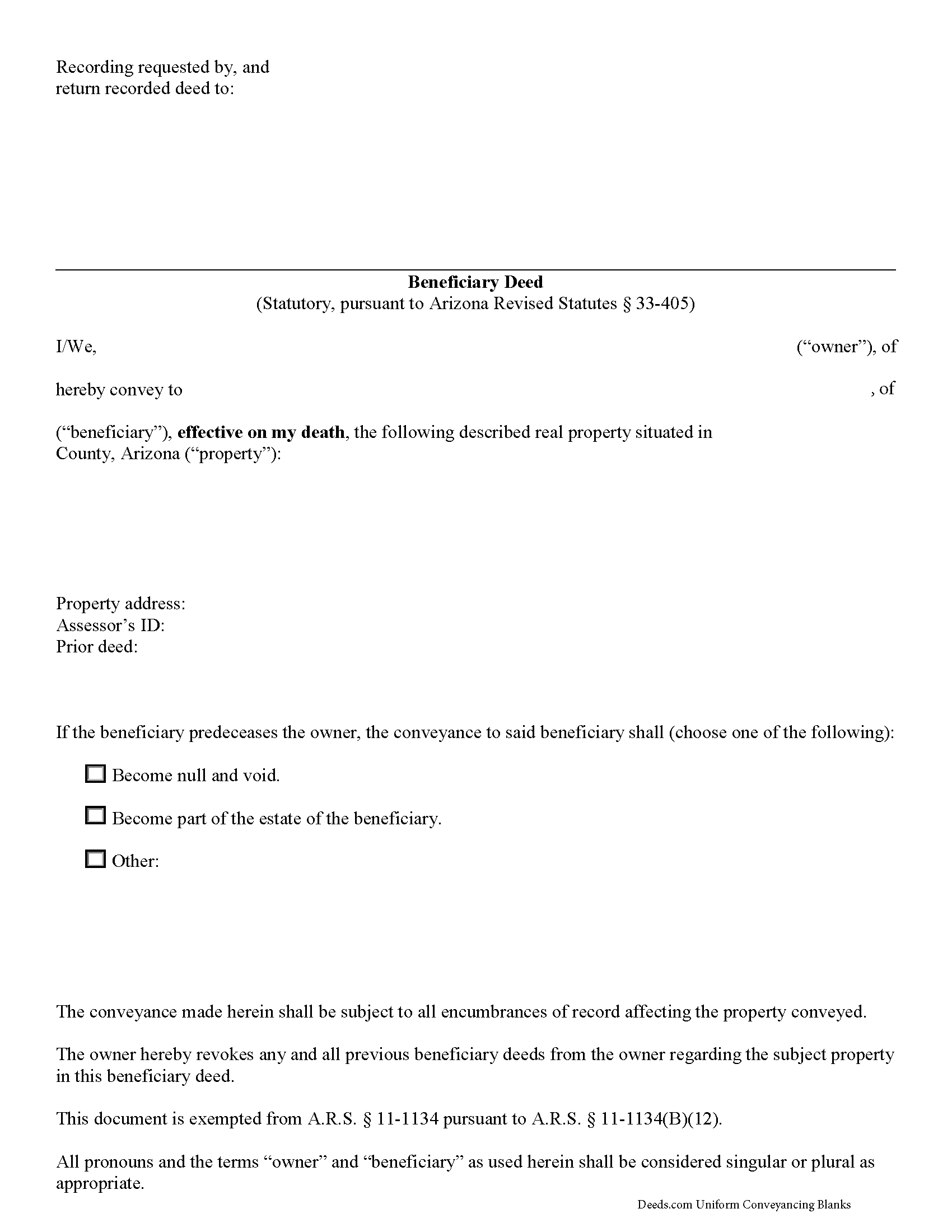
Arizona beneficiary deeds allow property owners to retain absolute control over their real estate, with the freedom to use, modify, or sell the land at will. The owner may also change the beneficiary or revoke the deed without any obligation to notify the beneficiary because the transfer of the remaining property rights is not finalized until the recipient records the appropriate documentation.
This instrument, governed by Arizona Revised Statutes 33-405, is a useful estate planning tool.
It gives owners/grantors of Arizona real estate the ability to initiate, but not complete, the transfer process to a designated beneficiary, while keeping all rights and title to the property during the owner's lifetime. This means the owner (grantor) may sell, rent, mortgage or otherwise use the property with no penalty for waste or obligation to the named beneficiary.
In addition, because the conveyance is not completed until the owner's death, he/she may change or remove beneficiary designations at will. Because of the potential for change, there is no obligation for the beneficiary/grantee to provide consideration (money or something else of value).
Arizona beneficiary deed must me... More Information about the Arizona Beneficiary Deed
Revocation of Beneficiary Deed
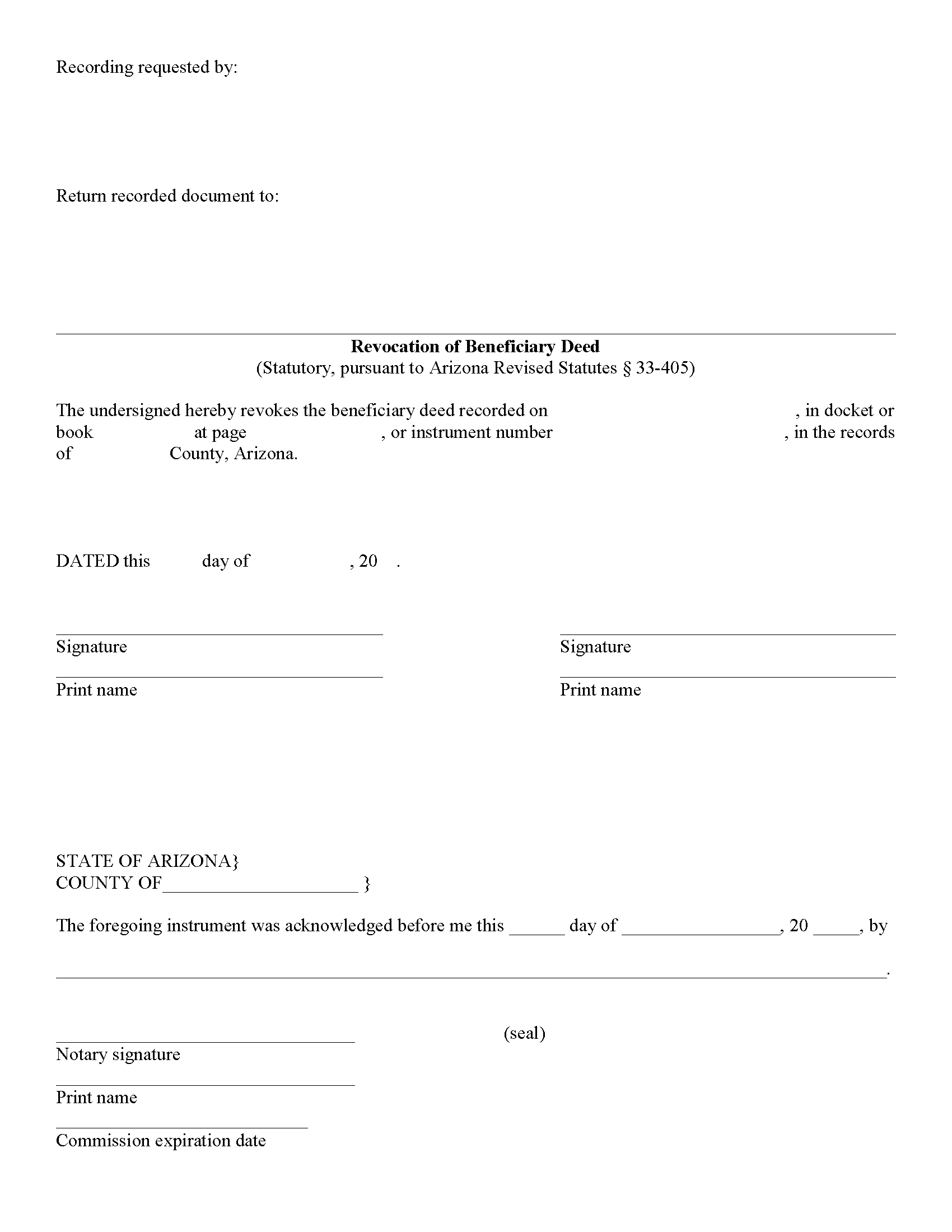
This statutory form meets or exceeds the requirements for revoking an Arizona beneficiary deed.
Arizona's beneficiary deeds are governed by A.R.S. 33-405. The statute provides forms and requirements for managing beneficiary deeds. One aspect of that management is the ability to revoke the deed.
(Arizona Revocation of Beneficiary Deed Package includes form, guidelines, and completed example)... More Information about the Arizona Revocation of Beneficiary Deed
Affidavit of Death
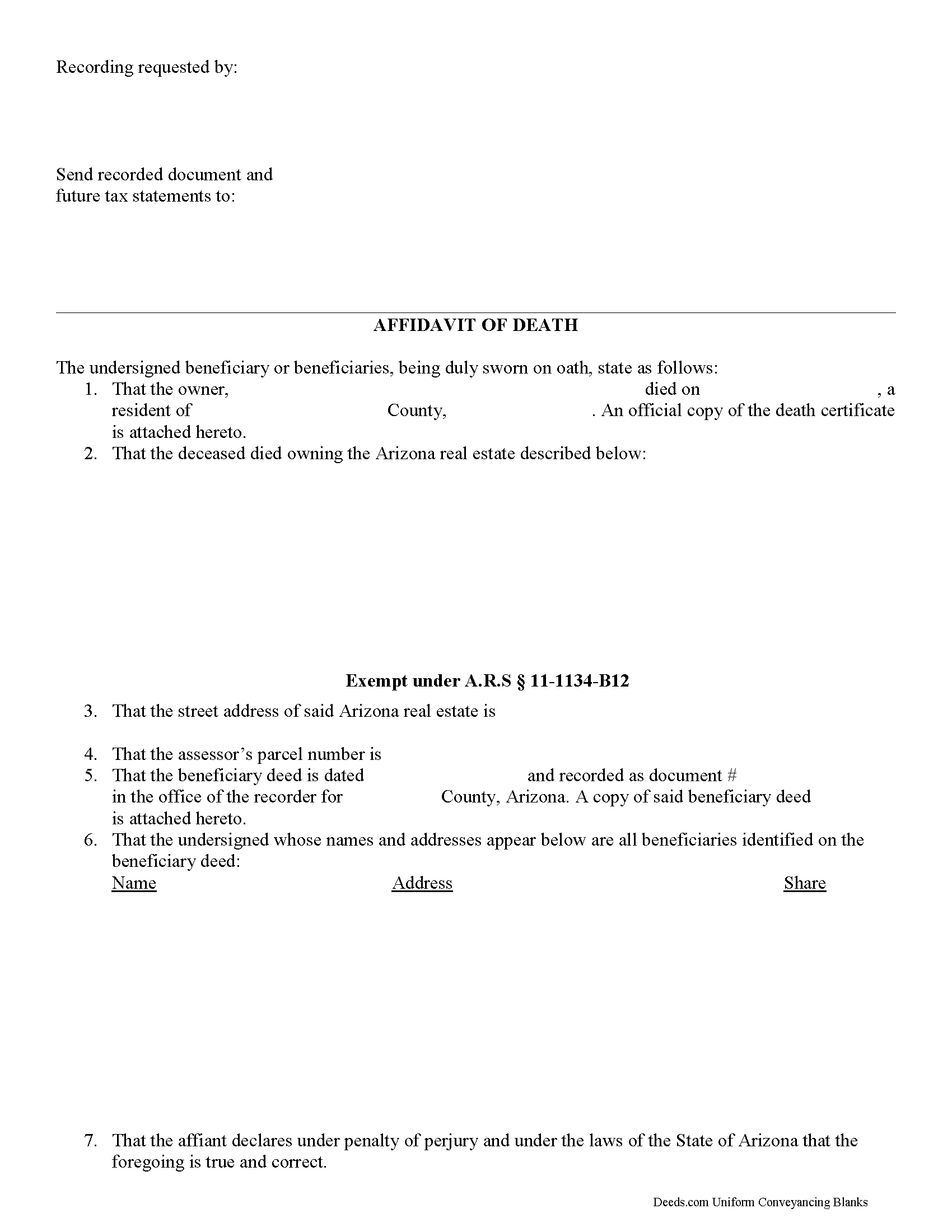
To redeem the land conveyed under an Arizona beneficiary deed, the named beneficiary must submit specific documentation to the recorder for the county where the deed was originally recorded. In general, this includes an official copy of the owner's death certificate and a copy of the recorded beneficiary deed. When a completed affidavit of death form accompanies these documents, the beneficiary formalizes the information within the context of a sworn statement.
Include an affidavit of death when recording the documents necessary to claim the interest in real property conveyed under an Arizona beneficiary deed.
(Arizona Affidavit of Death Package includes form, guidelines, and completed example)... More Information about the Arizona Affidavit of Death
Affidavit of Surviving Joint Tenant
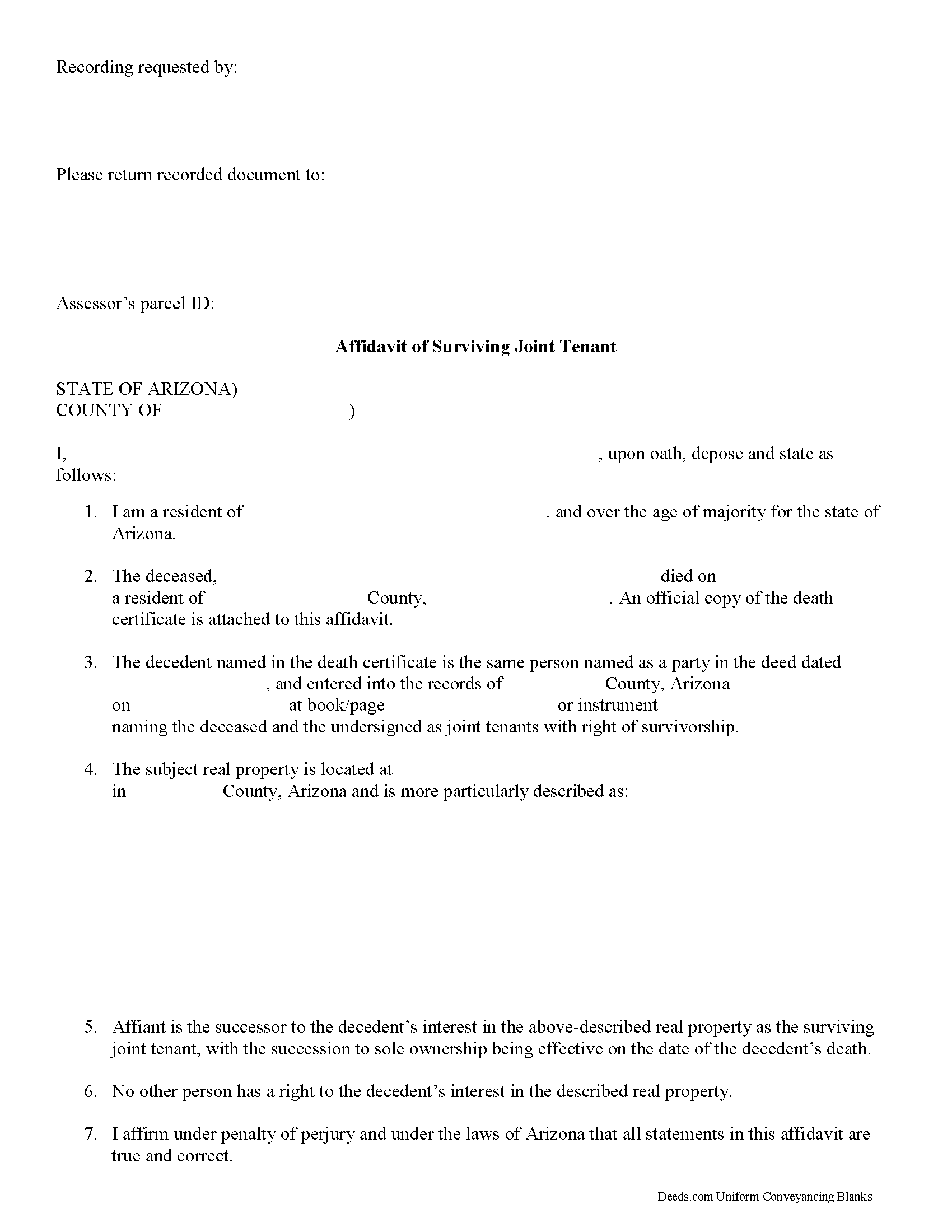
Complete and record this form, along with an official copy of the deceased joint tenant's death certificate, to formalize the transfer of property rights to the surviving co-owner.
To remove the decedent's name altogether, execute a new deed showing both joint tenants as grantors and only the survivor as a grantee. For example: "John Doe (deceased) and Richard Roe, as joint tenants with right of survivorship, convey to Richard Roe as sole owner." Present the new deed along with the affidavit of surviving joint tenant or submit it for recording on its own at a later date.
(Arizona Affidavit of Surviving Joint Tenant Package includes form, guidelines, and completed example)... More Information about the Arizona Affidavit of Surviving Joint Tenant
Affidavit of Succession to Interest in Community Property with Right of Survivorship
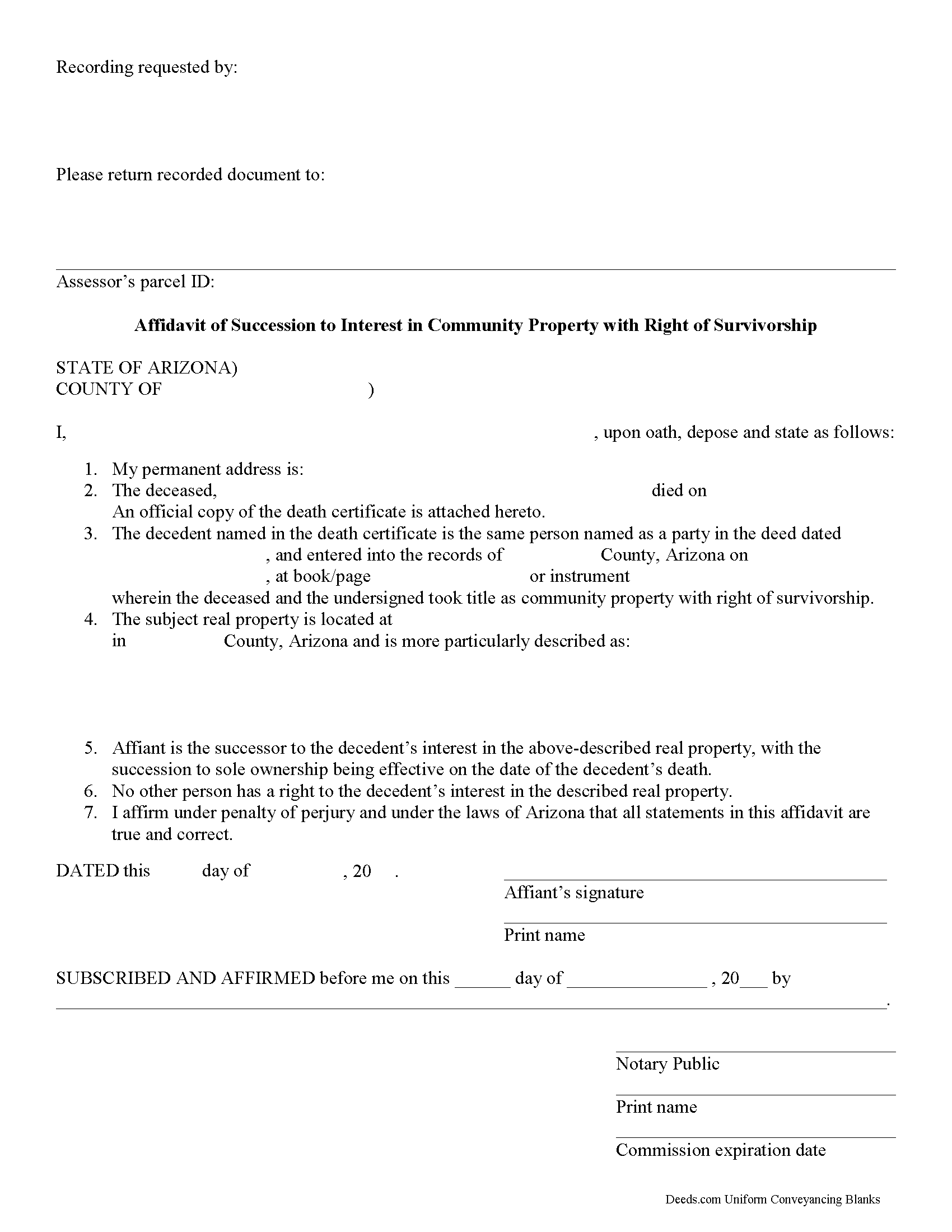
Arizona law allows married couples to hold title to real estate as community property with right of survivorship (A.R.S. 33-431). With this type of ownership, the property becomes a shared marital asset; if one spouse dies, the other gains full rights to the title automatically, by function of law.
Use this form to enter the transfer of full property rights to the surviving spouse of a married couple who owned Arizona real estate as community property with right of survivorship.
(Arizona Affidavit of Succession Package includes form, guidelines, and completed example)... More Information about the Arizona Affidavit of Succession to Interest in Community Property with Right of Survivorship
Durable Power of Attorney
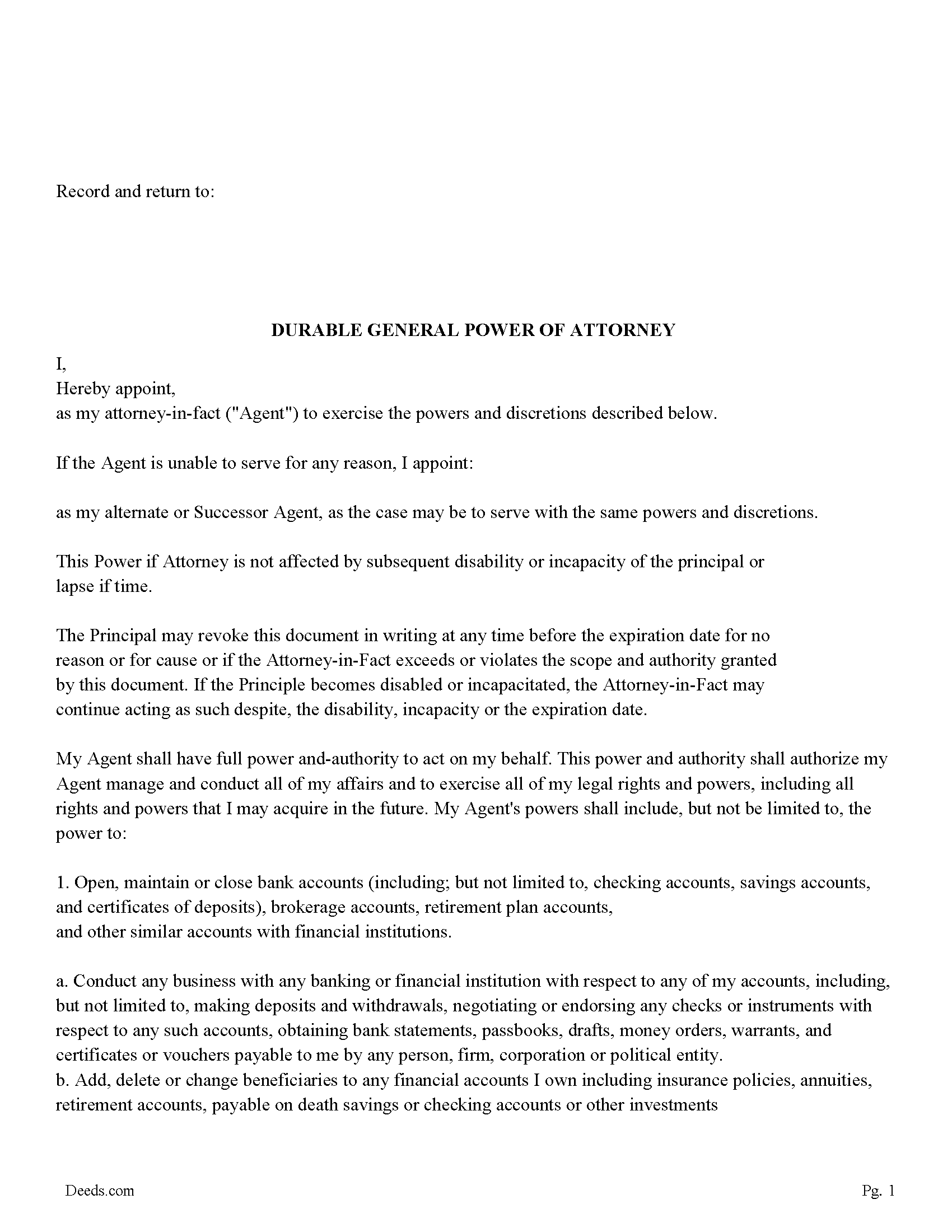
In a Durable Power of Attorney the principal designates an Agent. (The instrument shall contain words that demonstrate the principal's intent that the authority conferred in the durable power of attorney may be exercised) 14-5501 (A)
This POA stays active and expires on the Principal's death and is not affected by the principal's incapacity or disability. The Principal may also choose and alternate agent if so desired, if for some reason the agent is unable to serve.
The Power of Attorney shall contain language that the principle intent is (to create a Power of Attorney and clearly identifies the agent. (14-5501) (D)(1)
Must be (signed or marked by the principal or signed in the principal's name by some other individual in the principal's conscious presence and at the principal's direction.) (14-5501) (D)(2)
Must be Is witnessed by a person other than the agent, the agent's spouse, the agent's children or the notary public. (14-5501) (D)(3)
Actions the Agent can perform on your behalf
1. Open, maintain or close bank accounts
2. Provide for the support and protection of myself, my spouse, or of any minor child I have
3. Sell, exchange, buy, invest, or reinvest an... More Information about the Arizona Durable Power of Attorney
Special Durable Power of Attorney
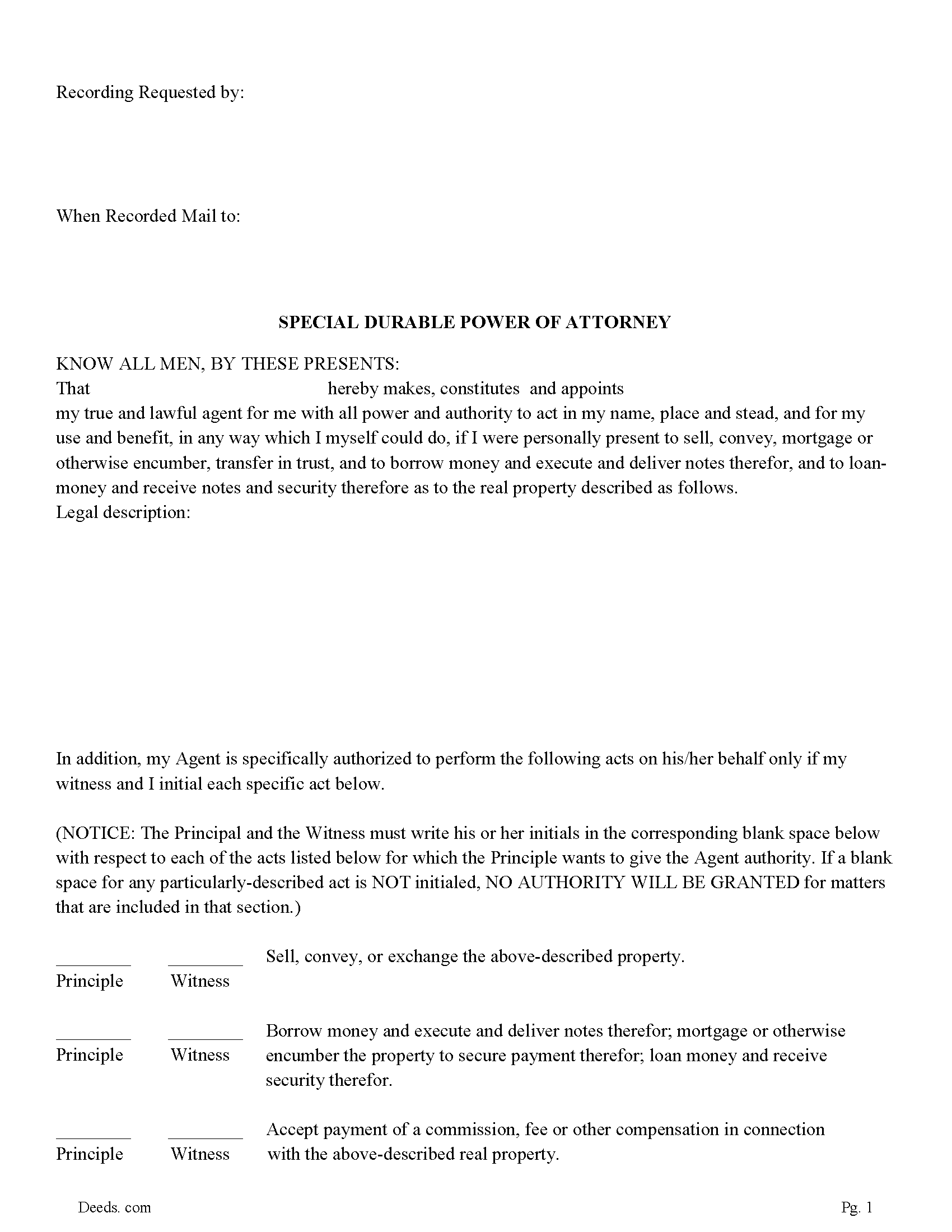
This is a special durable power of attorney for real property. Durable (stays active, even if the principal becomes disabled or incapacitated). The Agent can purchase, sell, mortgage, borrow money, etc., on/against a specific property (which must be described). The powers granted by the principal can be broad or narrowly defined. This is done by choosing which powers the Agent can perform, as listed below. Other acts can be granted to meet the principal's specific needs.
1. Sell, convey, or exchange the above-described property.
2. Borrow money and execute and deliver notes therefor; mortgage or otherwise encumber the property to secure payment therefor; loan money and receive security therefor.
3. Accept payment of a commission, fee or other compensation in connection with the above-described real property.
4. Accept payment of all or any portion of the proceeds from the sale of the above-described property.
5. Acquire any interest in the above-described real property.
6. Accept the conveyance or beneficial interest therefor community property with right of survivorship or as joint tenants with right of survivorship with any others, including my said Agent as one... More Information about the Arizona Special Durable Power of Attorney
Revocation of Power of Attorney
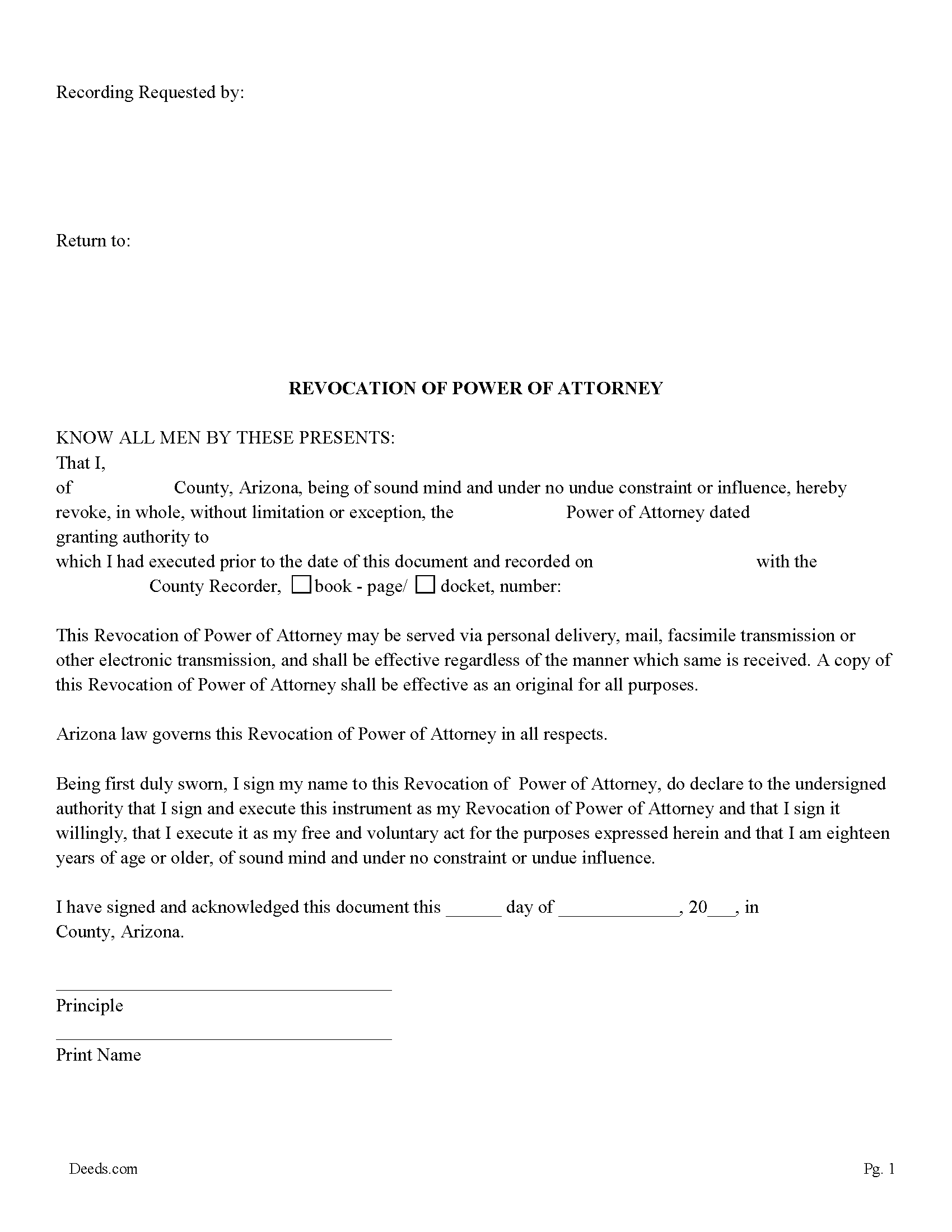
Use this form to revoke a previously issued Power of Attorney, [General, Special, Durable, Parental, etc] whether recorded or not. If a Power of Attorney was recorded or referenced any (transfer of real estate or any legal or equitable interest therein, excluding leases), then the Revocation Notice must be recorded. (33-41)(01) This Revocation Notice is fully formatted to meet County Recording Requirements. It includes a page that lists where the Revocation Notice was sent for documentation.
(Arizona Revocation of POA Package includes form, guidelines, and completed example)... More Information about the Arizona Revocation of Power of Attorney
Mineral Deed
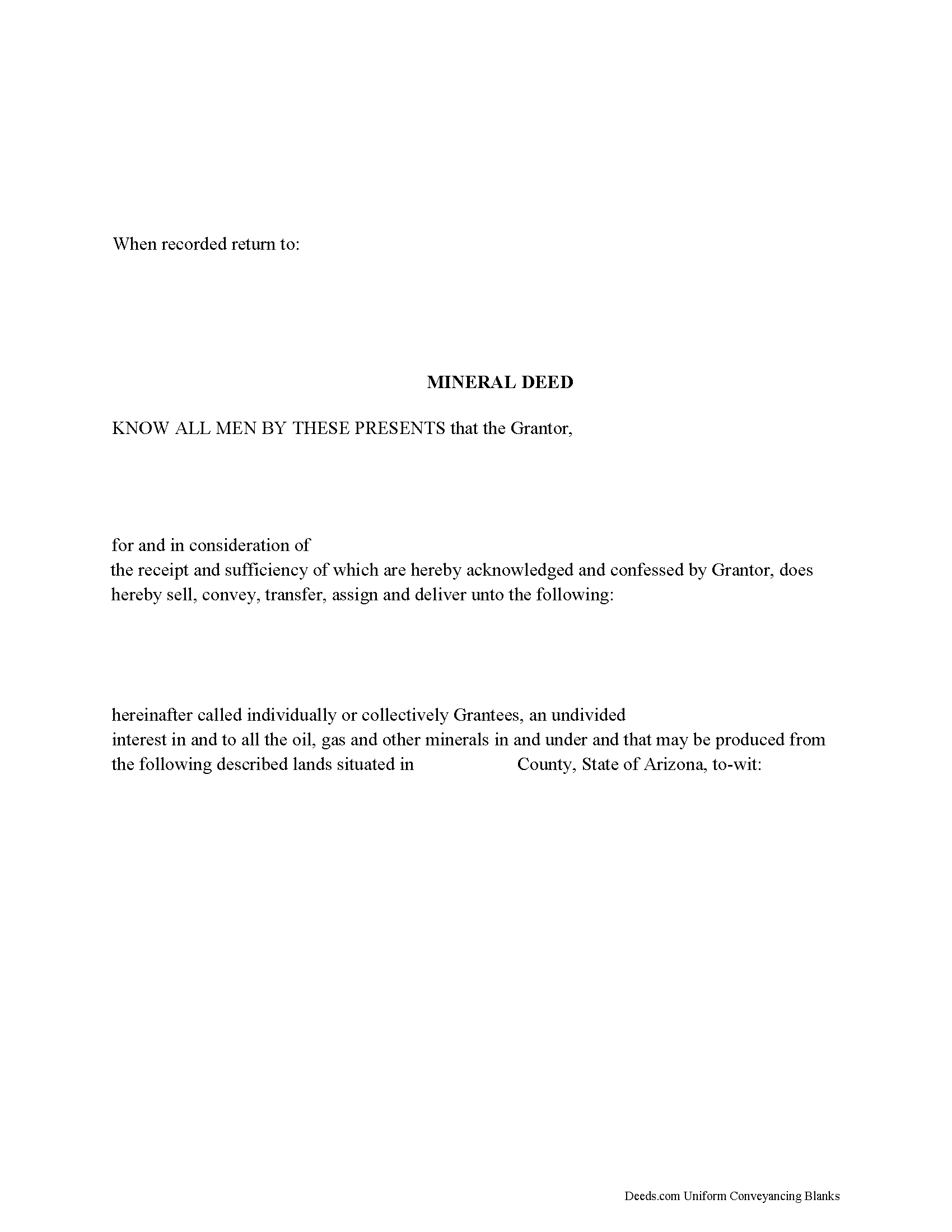
The General Mineral Deed in Arizona transfers oil, gas, and mineral rights from the grantor to the grantee. THIS IS NOT A LEASE. There are no Exceptions or Reservations included.
The transfer includes the oil, gas and other minerals of every kind and nature. It also transfers any and all rights to receive royalties, overriding royalties, net profits interests or other payments out of or with respect to those oil, gas and other minerals. The Grantor can stipulate the percentage of Mineral Rights the Grantee will receive and is made subject to any rights existing under any valid and subsisting oil and gas lease or leases of record.
This general mineral deed gives the grantee the right to access, for the purpose of mining, drilling, exploring, operating and developing said lands for oil, gas, and other minerals, and storing handling, transporting and marketing of such.
In this document the Grantor Warrants and will defend said Title to Grantee. Use of this document has a permanent effect on your rights to the property, if you are not completely sure of what you are executing seek the advice of a legal professional.
(Arizona Mineral Deed Package includes form, guidelines, a... More Information about the Arizona Mineral Deed
Mineral Quitclaim Deed
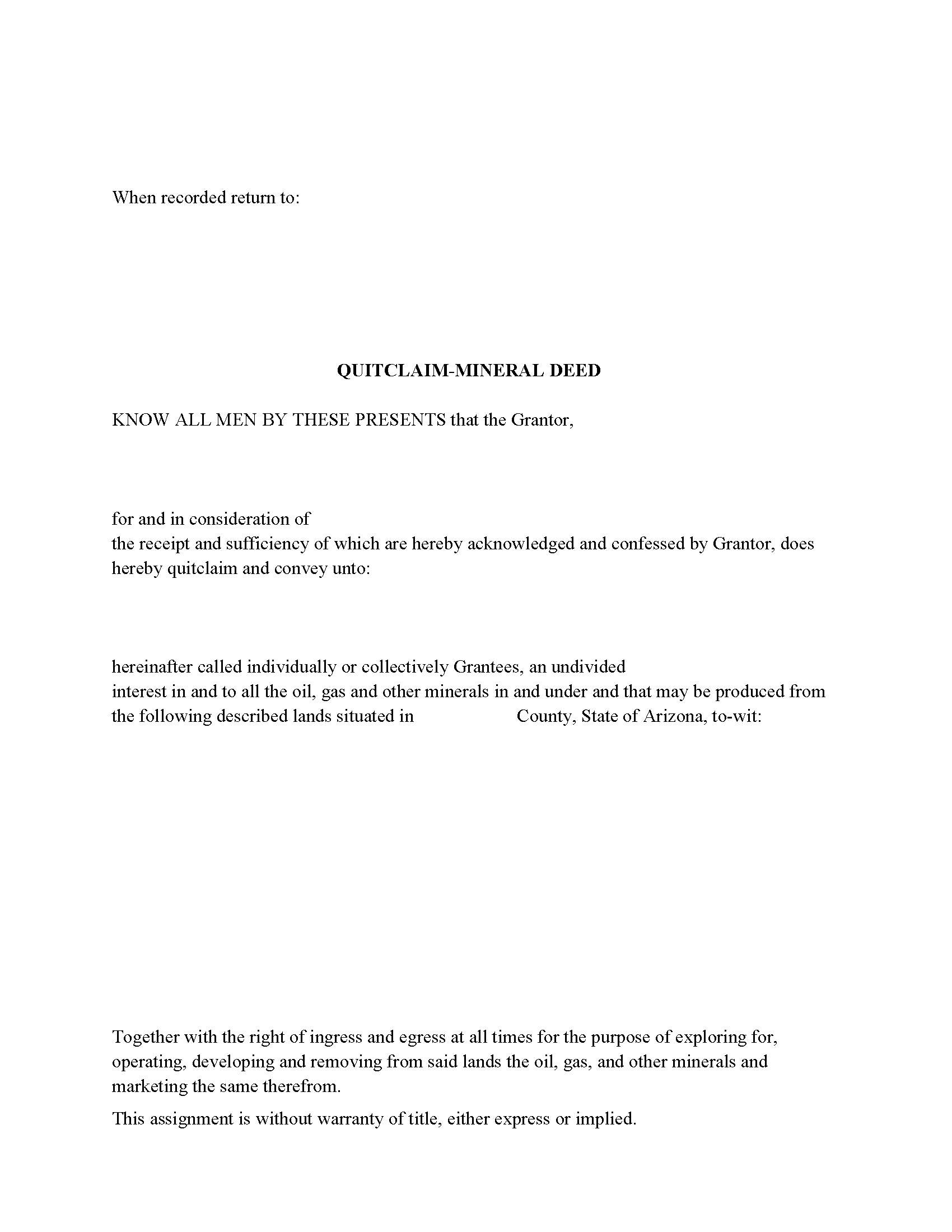
This is a General Mineral Quitclaim Deed used in Arizona for transferring oil, gas, and mineral rights from the grantor (seller) to the grantee (buyer). It's important to note that this document is NOT A LEASE but a transfer of ownership.
Scope of Transfer: The deed encompasses the transfer of all types of mineral rights, including oil and gas, without any exceptions or reservations. The grantor specifies the percentage of mineral rights to be transferred.
Rights and Access: The grantee is granted rights to access the land for mining, drilling, exploration, operation, development of minerals, and activities related to the handling, storage, transport, and marketing of these minerals.
Title and Warranty: The grantor quitclaims the mineral rights, which means they do not guarantee or warrant the clarity or accuracy of the title. The grantee accepts the rights 'as is', meaning they bear the risk of any title defects or discrepancies.
Uses: Mineral deeds with quitclaim are often used in situations where the grantor wants to quickly release any interest they might have in mineral rights, such as in settling estates, resolving disputes, clearing up uncertainties about ownersh... More Information about the Arizona Mineral Quitclaim Deed
Memorandum and Notice of Agreement
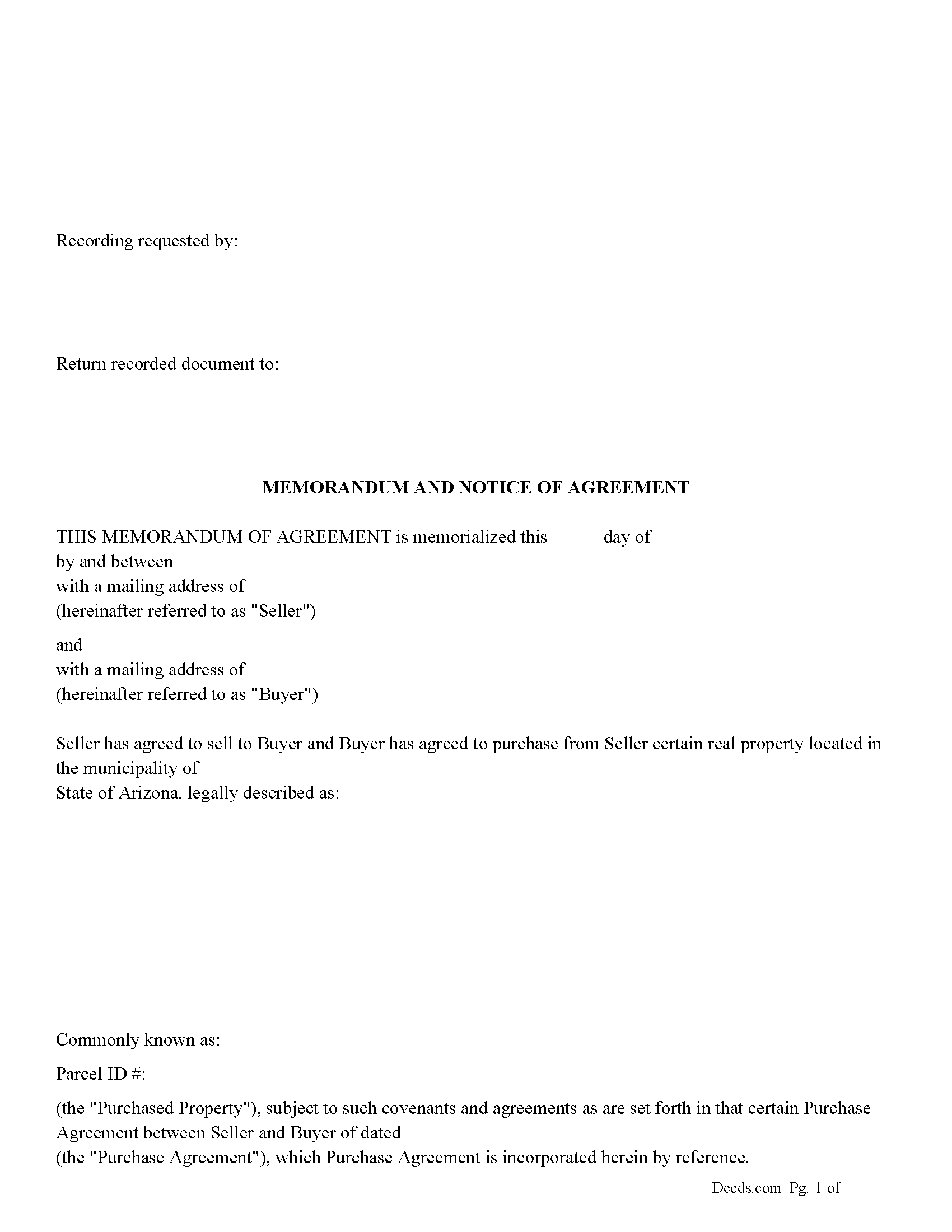
A "Memorandum of Purchase Agreement" commonly referred to as a "Memorandum of Agreement" (MOA), Memorandum of Contract (MOC) or "Memorandum of Understanding" (MOU) in the context of real estate, is used primarily as a means to provide public notice of an equitable interest in a real estate transaction without disclosing the full details of the purchase agreement. This document is particularly useful in transactions where the buyer and seller have agreed to terms but the final closing and transfer of the deed have not yet occurred. By recording this memorandum with the county recorder's office, the buyer establishes a public record of their interest in the property, which can protect against subsequent claims or liens by third parties.
Key Purposes of a Memorandum of Purchase Agreement:
1. Notice of Equitable Interest: The memorandum serves as notice to the public that the buyer has an equitable interest in the property due to the purchase agreement. This is important in protecting the buyer’s interest against claims by other parties who might otherwise be unaware of the agreement.
2. Protection During the Closing Process: Real estate transactions can involve a lengthy clo... More Information about the Arizona Memorandum and Notice of Agreement
Deed of Trust
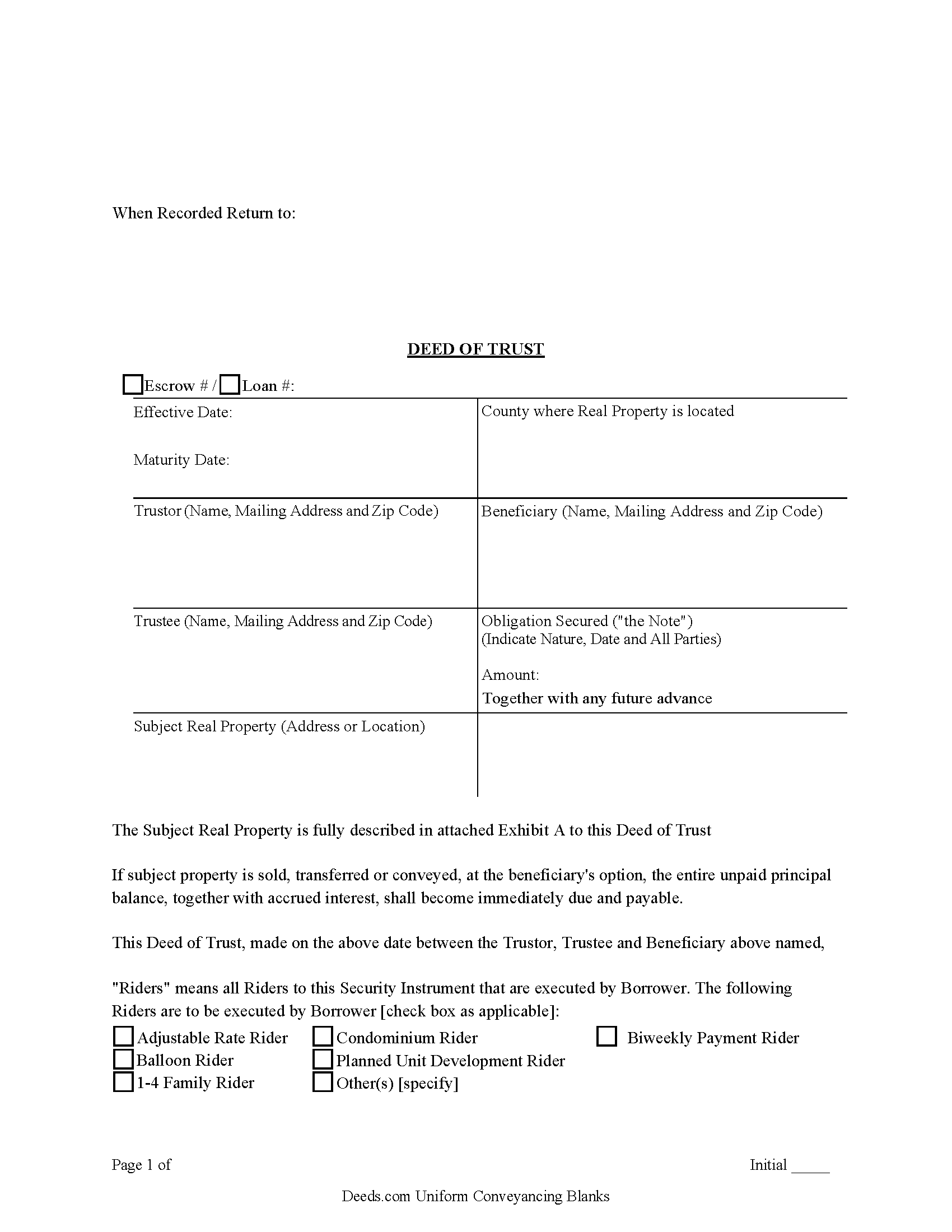
In Arizona, a Deed of Trust is the most commonly used instrument to secure a loan. Foreclosure can be done non-judicially, saving time and expense. This process is called a Trustee Sale.
There are three parties in this Deed of Trust:
1- The Trustor (Borrower)
2- Beneficiary (Lender) and a
3- Trustee (Neutral Third Party)
Basic Concept. The Trustor (Borrower) conveys property title to a Trustee (Neutral Party). A Trustee or beneficiary can take an action against any person for damages such as but not limited to:
(1. Physical abuse to or destruction of the trust property, or any portion thereof.)
(2. Waste.)
(3. Impairment of the security provided by the trust deed.) 33-806
This Deed of Trust states:
Trustor (Borrower) shall take reasonable care of the Subject Real Property and the buildings thereon and shall maintain them in good repair and condition as at the original date of this Deed of Trust, ordinary depreciation excepted.
Right to Inspect Subject Real Property. At all convenient and reasonable times, upon prior notice to Trustor, Beneficiary or Trustee shall have the right and license to go on and into the Subject Real Property to inspect it in order to determi... More Information about the Arizona Deed of Trust
Assignment of Deed of Trust
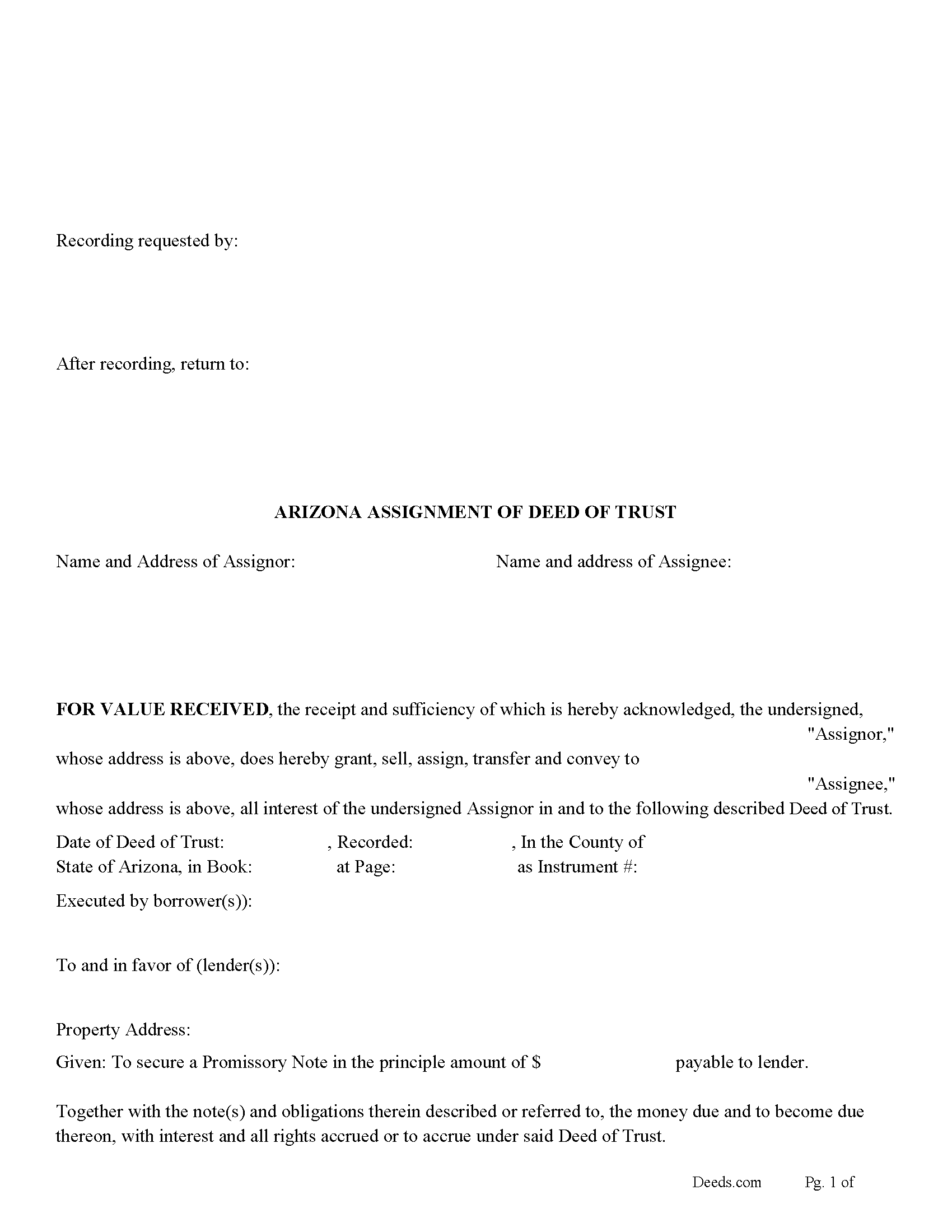
This form is used by the current holder of a Deed of Trust to transfer rights to another party, usually when a note or deed of trust is sold. (If acknowledged as provided by law, shall from the time of being recorded impart notice of the content to all persons, including subsequent purchasers and encumbrancers for value.) ARS 33-818
Current Borrowers must be notified of the assignment. Notification consists of contact information of the new creditor, recording dates, recording instrument numbers, changes in loan, etc. Included are "Notice of Assignment of Deed of Trust" forms.
The Truth and lending act requires that borrowers be notified when their deed of trust debt has been sold, transferred, or assigned to a new creditor. Generally, within 30 days to avoid up to $2,000.00 in statutory damages, plus reasonable attorney's fees. Systematic violations can reach up $500,000.00.
(Arizona Assignment of Deed of Trust Package includes form, guidelines, completed example, and notice of assignment forms) For use in Arizona only.
... More Information about the Arizona Assignment of Deed of Trust
Deed of Release and Reconveyance
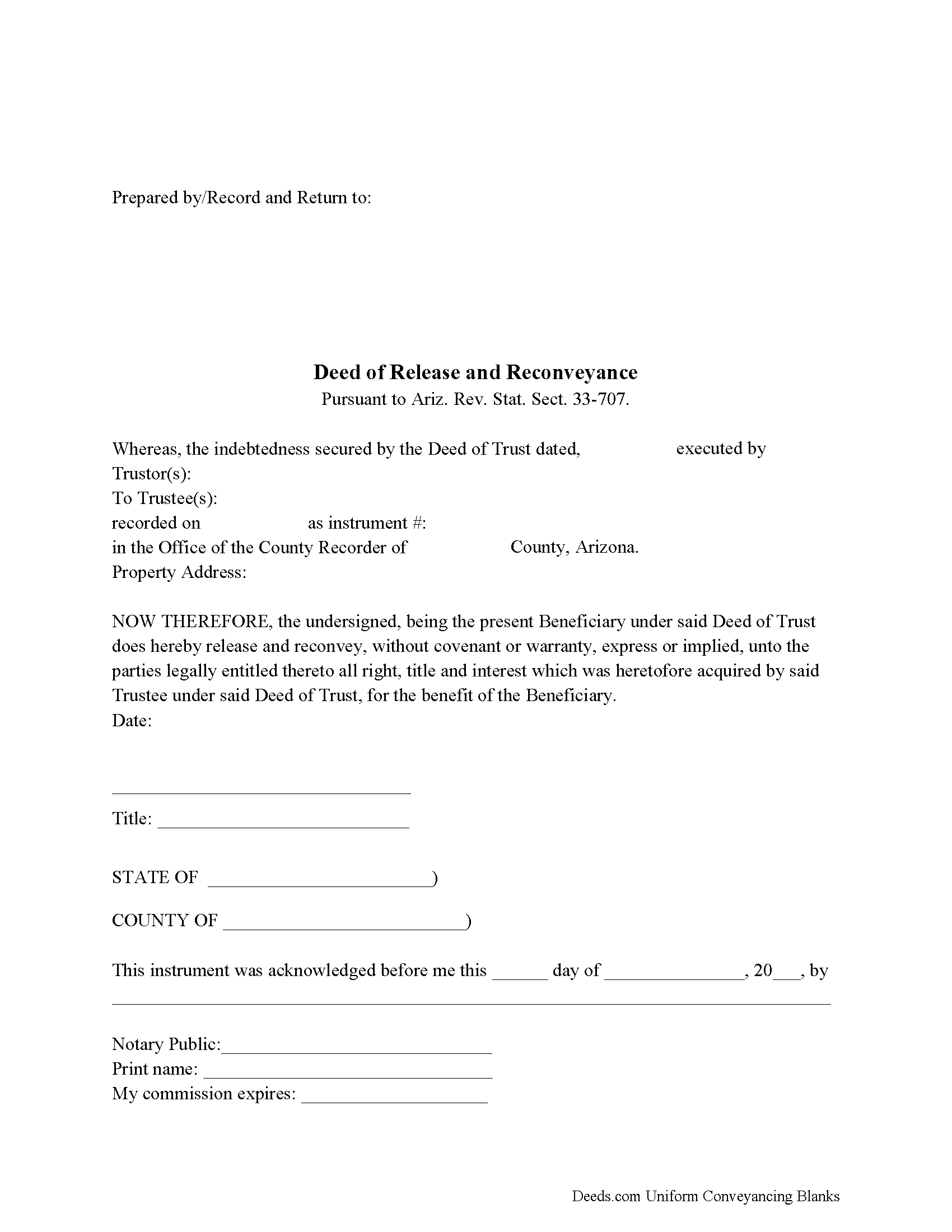
If a trustee or person entitled to payment receives full satisfaction of a deed of trust, he/she shall acknowledge satisfaction of the deed of trust by recording a release and reconveyance of the deed of trust, (It shall not be necessary for the trustee to join in the acknowledgment or satisfaction, or in the release. The recorded release or satisfaction of deed of release and reconveyance constitutes conclusive evidence of full release of the deed of trust in favor of purchasers and encumbrancers for value and without actual notice.)
In this form the Lender signs and executes the release.
(Arizona Deed of Release Package includes form, guidelines, and completed example) For use in Arizona only.... More Information about the Arizona Deed of Release and Reconveyance
Deed of Partial Release and Partial Reconveyance
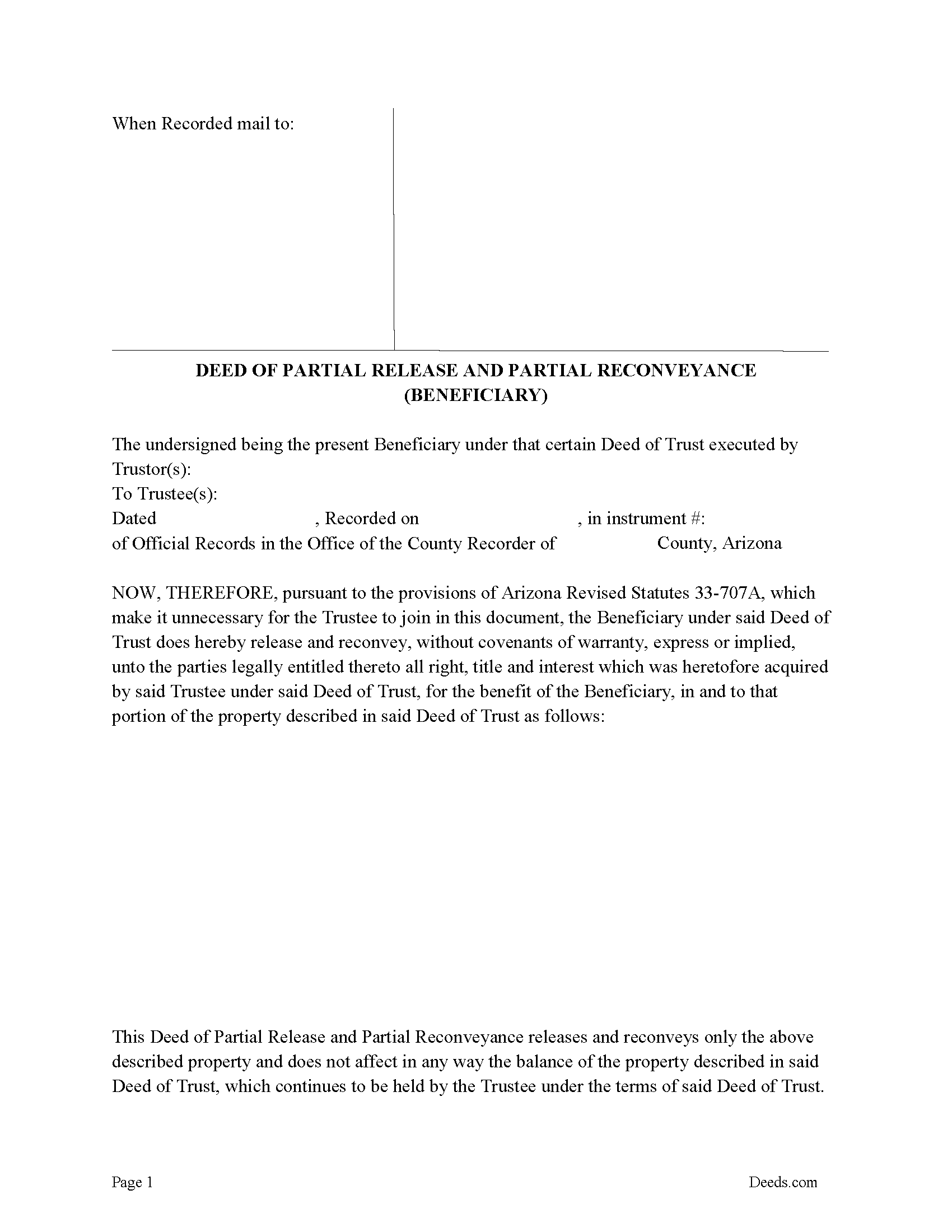
This form is formatted under Arizona Revised Statutes 33-707A, which allows the Beneficary/Lender the right to execute a Deed of Partial Release and Partial Reconveyance without the Trustee's involvement. This form states:
NOW, THEREFORE, pursuant to the provisions of Arizona Revised Statutes 33-707A, which make it unnecessary for the Trustee to join in this document.
This Deed of Partial Release and Partial Reconveyance releases and reconveys only the described property and does not affect in any way the balance of the property described in said Deed of Trust, which continues to be held by the Trustee under the terms of said Deed of Trust.
Use this form when a Deed of Trust is involved. Beneficiary/Lender must sign/execute this document.
(Arizona Deed of Release Package includes form, guidelines, and completed example)
... More Information about the Arizona Deed of Partial Release and Partial Reconveyance
Trustee Deed
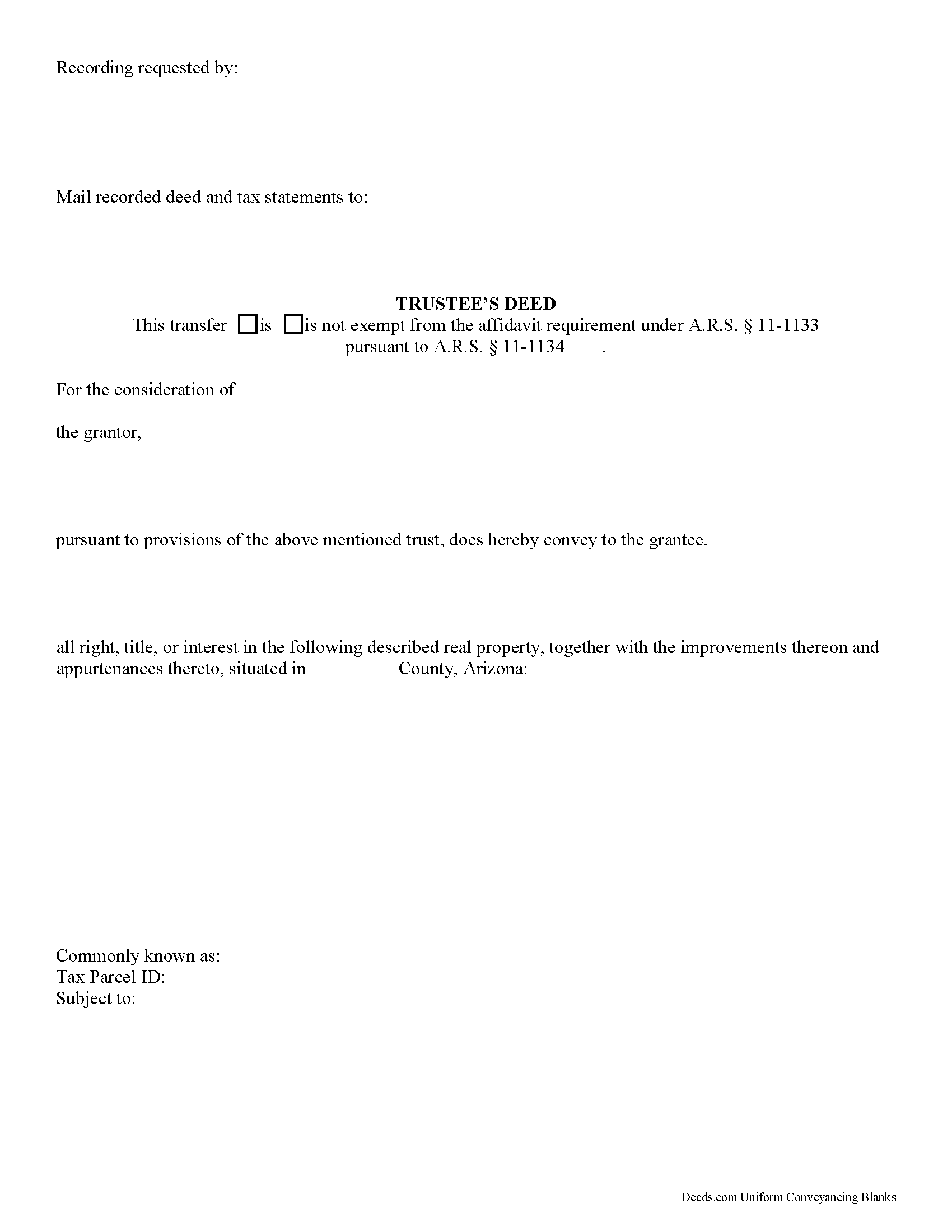
The function of a trustee's deed is to transfer real property out of a trust. In Arizona, a separate form, called a Trustee's Deed Upon Sale, is used in cases of foreclosure to transfer real property under a deed of trust to a grantee who has purchased the property at public auction. Both versions are named for the person using the deed.
In a trustee's deed, the trustee serves as the grantor to convey real property out of the trust and to the grantee. The power of the trustee to sell trust property is granted by the terms of a trust agreement previously executed between the settlor and the trustee. The settlor is the party who originally conveyed the property into the trust (A.R.S 14-10103(16)).
In addition to meeting the content and formatting requirements of traditional conveyances such as warranty or quitclaim deeds, trustee's deeds also include identification of the trustee, information about the trust, and the disclosure of the trust's beneficiaries.
In many cases, a trustee's deed is used to transfer property out of a trust and to a trust beneficiary with only nominal actual consideration for the transfer. A trust beneficiary is someone who has either a present or... More Information about the Arizona Trustee Deed
Trustee Deed Foreclosure
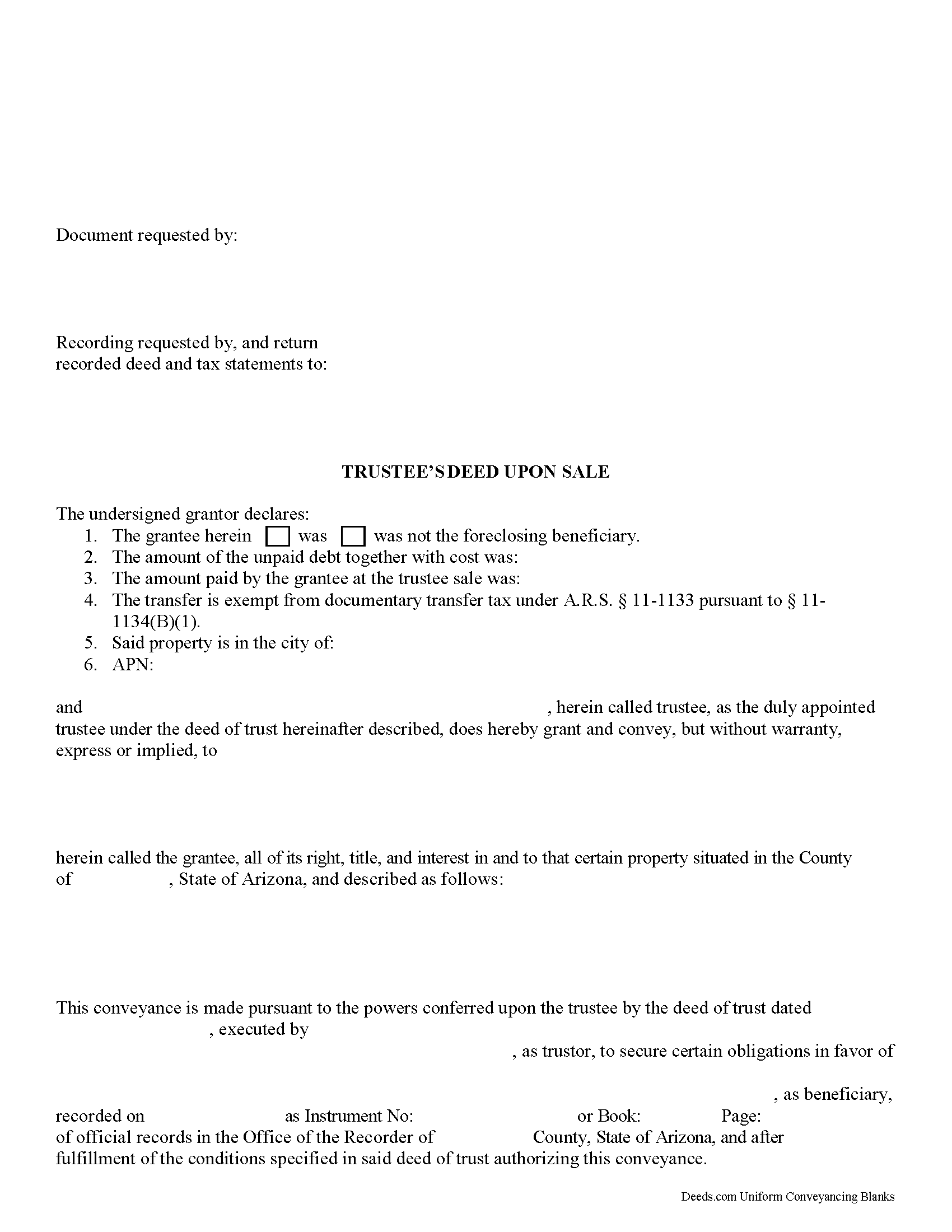
Arizona Trustee's Deed Upon Sale
Arizona recognizes two types of foreclosure: judicial and non-judicial. A judicial foreclosure must go through Superior court (as is the case with mortgages), whereas a non-judicial closure is governed by state statutes (as is the case with deeds of trust).
The laws governing Arizona's trustee's deeds upon sale are included in Sections 33-800 et seq of the Arizona Revised Statutes. This instrument is used by a trustee to convey real property identified in a non-judicial foreclosure. Qualifications for trustees are outlined in A.R.S. 33-803.
Under a trust deed, the trustee holds title to the property as security for the repayment of a loan. The trust deed includes a power of sale, which defines the conditions that prompt a sale, and authorizes the trustee to sell the property ( 33-807). If the borrower (the trustor under the trust deed) defaults on the trust deed or breaches the contract, the lender (beneficiary) instructs the trustee to initiate the foreclosure process. The trustee, then, is responsible for the sale of the property upon foreclosure using the trustee's deed upon sale.
Before the property is sold at auction, the trustee... More Information about the Arizona Trustee Deed Foreclosure
Affidavit of Successor Trustee
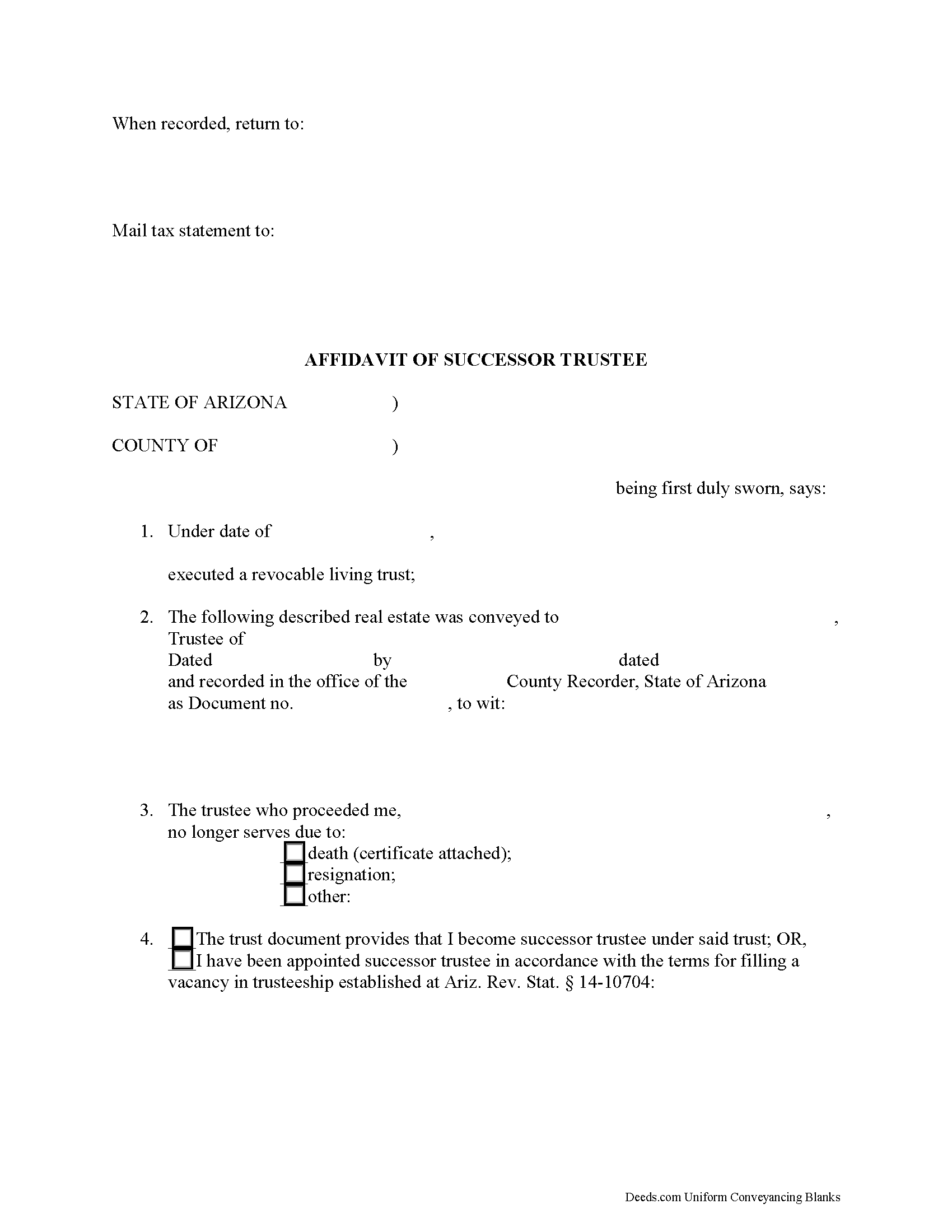
To transfer real property in a living trust from a trustee to a successor, the successor trustee executes and records an affidavit of successor trustee. The document contains sworn statements confirmed in the presence of a notary public, and provides notice that the successor has assumed the authority of the preceding trustee relevant to real property held in trust.
In addition to naming the affiant (the person making the sworn statements; in this case, the successor trustee), the affidavit contains the basic details about the trust for which the successor is assuming trusteeship, including its name, date, and settlor (person who created or contributed assets to the trust).
The form also requires information about the deed transferring the subject real property into trust, including the type and date of the deed, its location on record, and the grantee of the deed. The grantee is generally the preceding trustee who held title to the property. Because the affidavit confirms the successor's authority regarding the real property, the form also requires the legal description of said property. Further, the affidavit contains the details concerning the change in trusteeship.
I... More Information about the Arizona Affidavit of Successor Trustee
Personal Representative Deed
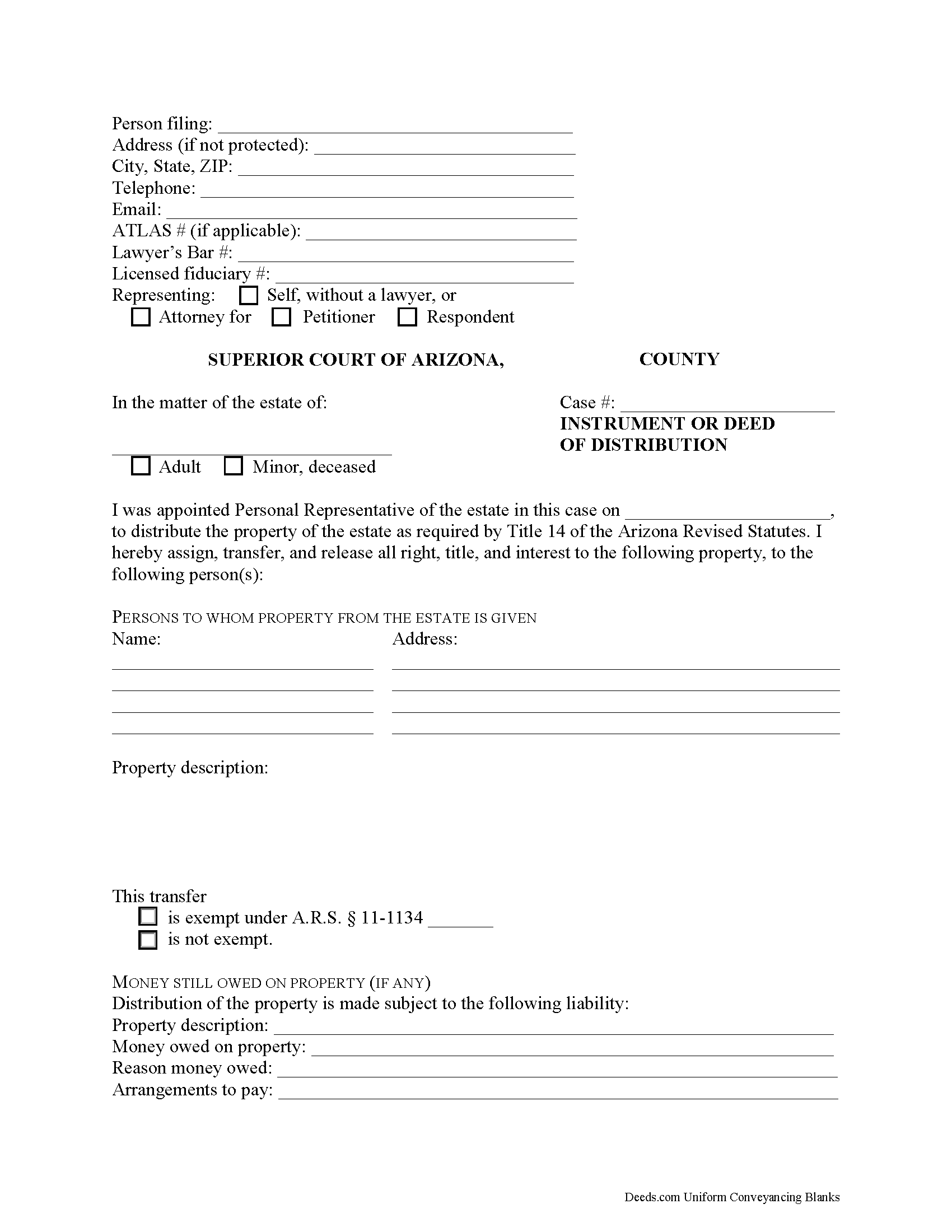
The Personal Representative's Deed of Distribution provides essential information about the probate estate and the property transfer in one document.
When a person dies, someone must take responsibility for distributing the remaining assets according to the instructions set out in the decedent's will (if there is one), while also following state and local laws. This person is often known as an executor or an administrator of the estate. Arizona, however, identifies the individual who accepts that fiduciary duty as a personal representative.
One common task involves transferring title on the decedent's real estate. Deeds used for this purpose must meet the same state and local requirements as warranty or quitclaim deeds. In addition, they include other details, such as facts about the deceased property owner, the probate case, and anything else deemed necessary by the situation.
Note that these deeds may need to be recorded with the probate registrar/clerk of superior court as well as the county recording office. Consult with a legal professional who is involved in managing the specific probate case to ensure that all recording and notice requirements are met.
Personal... More Information about the Arizona Personal Representative Deed
Affidavit of Disclosure
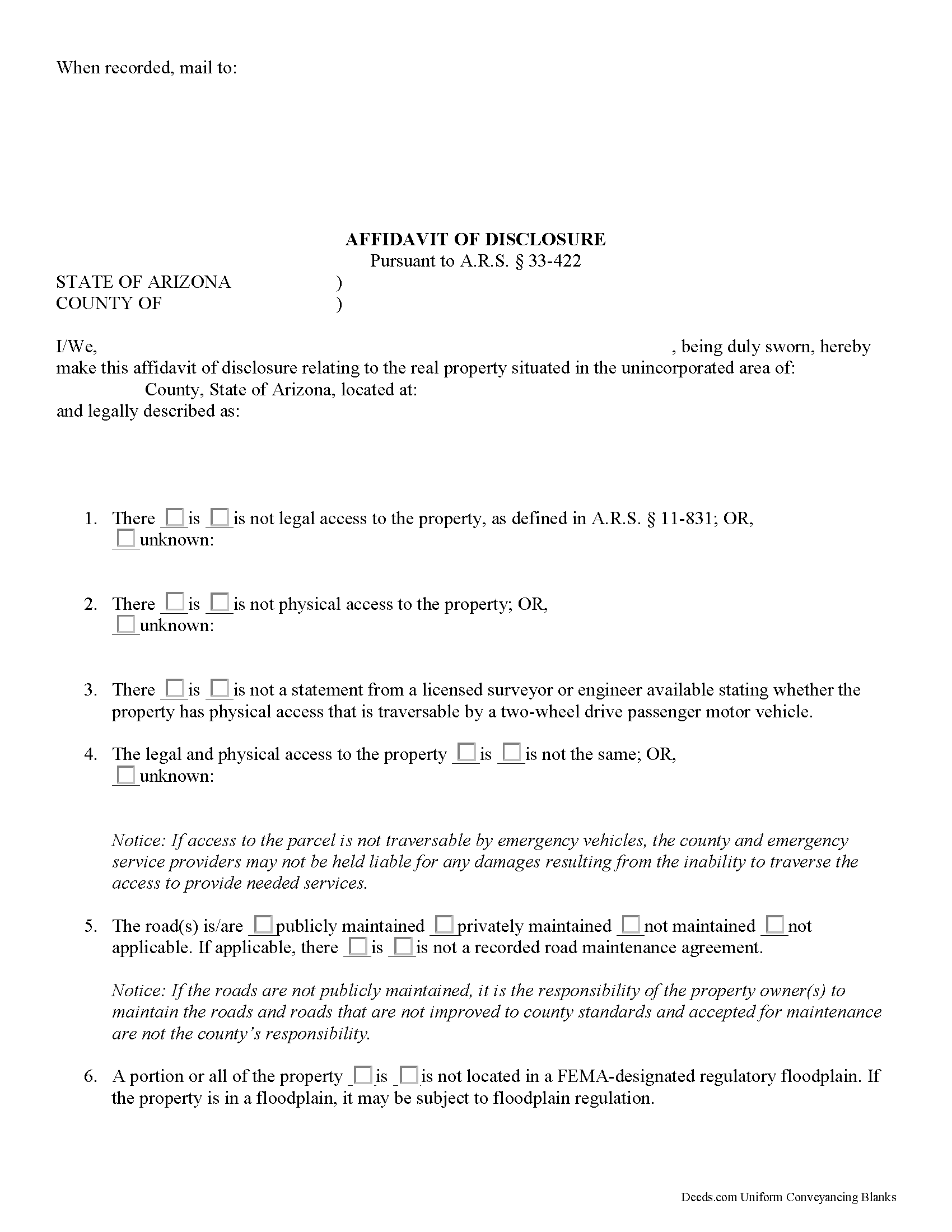
Before a transfer of real property is finalized, Arizona law requires the seller to disclose material facts about the relevant property to the buyer in a seller's disclosure report.
In Arizona, sellers of five or fewer parcels of improved or unimproved land located in an unincorporated part of a county (any area with no formally organized municipal government), must furnish buyers, in addition to any seller disclosure documents, another document called an affidavit of disclosure, under A.R.S. 33-422. The seller uses the affidavit to disclose additional material facts about the property subject to the pending conveyance. The seller is liable for omissions or misrepresentations made within the affidavit, which contains statements made under oath by the seller in the presence of a notary public or other official qualified by the State of Arizona.
By statute, the seller must provide the written disclosure to the buyer at least seven days prior to the transfer of property ( 33-422(A)). The buyer is then required to acknowledge receipt of the affidavit, and has the right to rescind the transaction up to five days after receiving the disclosure ( 33-422(D)). The affidavit is reco... More Information about the Arizona Affidavit of Disclosure
Disclaimer of Interest
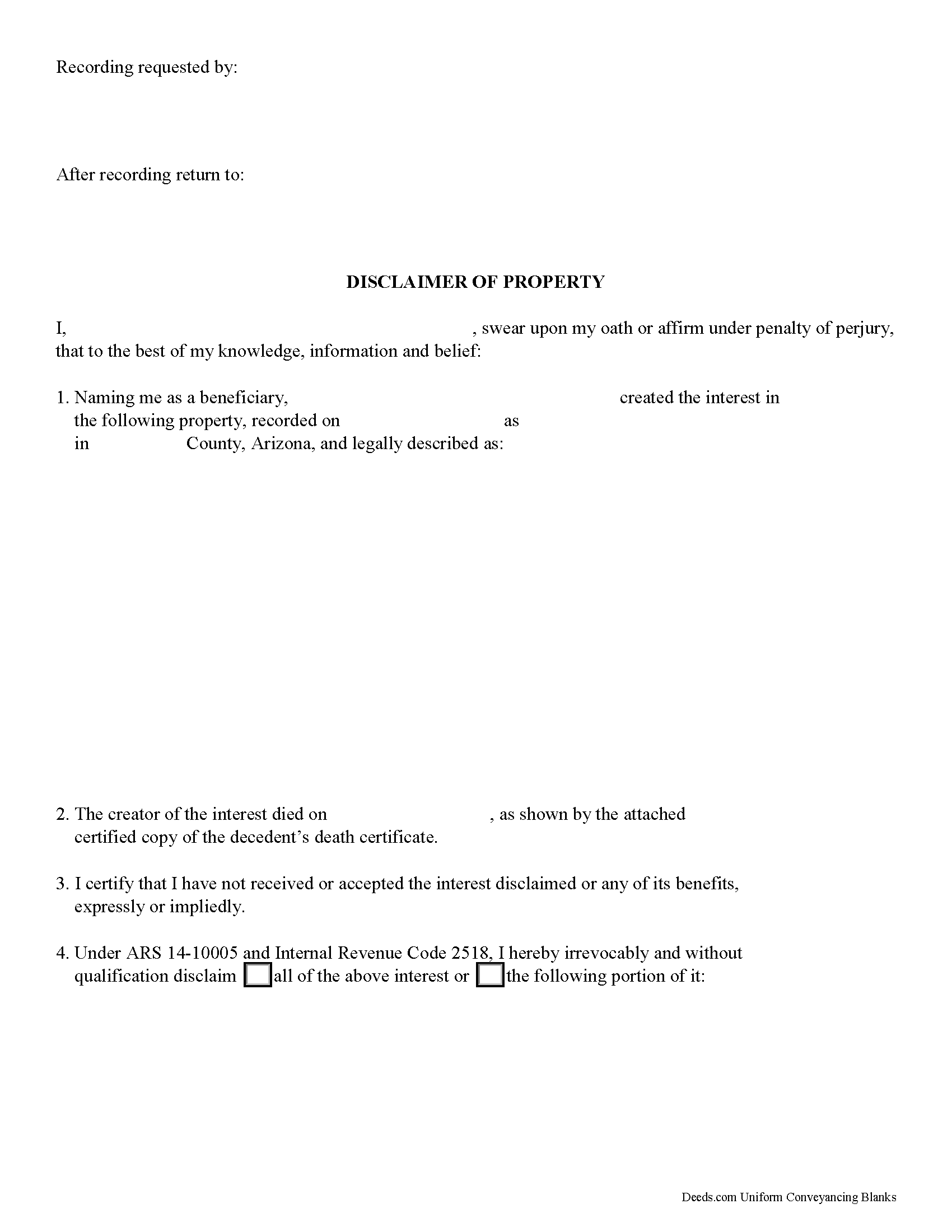
Under the Arizona Uniform Disclaimer of Property Interests Act, found at ARS Title 14, Chapter 10, the beneficiary of an interest in property may renounce the gift, either in part or in full. Note that the option to disclaim is only available to beneficiaries who have not acted in any way to indicate acceptance or ownership of the interest (see ARS 14-10013).
The disclaimer must be in writing and include a description of the interest, a declaration of intent to disclaim all or a defined portion of the interest, and be signed by the disclaimant in front of a notary (see ARS 14-10005(C)).
File the disclaimer within nine months of the transfer (e.g., the death of the creator of the interest) with the probate court (ARS 14-10012). In the case of real property, acknowledge the disclaimer as is required for a deed and record it in the county where the property is located (ARS 14-10015). In addition, deliver a copy of the disclaimer to the person or legal entity with current custody or possession of the property.
A disclaimer is irrevocable and binding for the disclaiming party, so be sure to consult an attorney when in doubt about the drawbacks and benefits of disclaiming inheri... More Information about the Arizona Disclaimer of Interest
Certificate of Trust
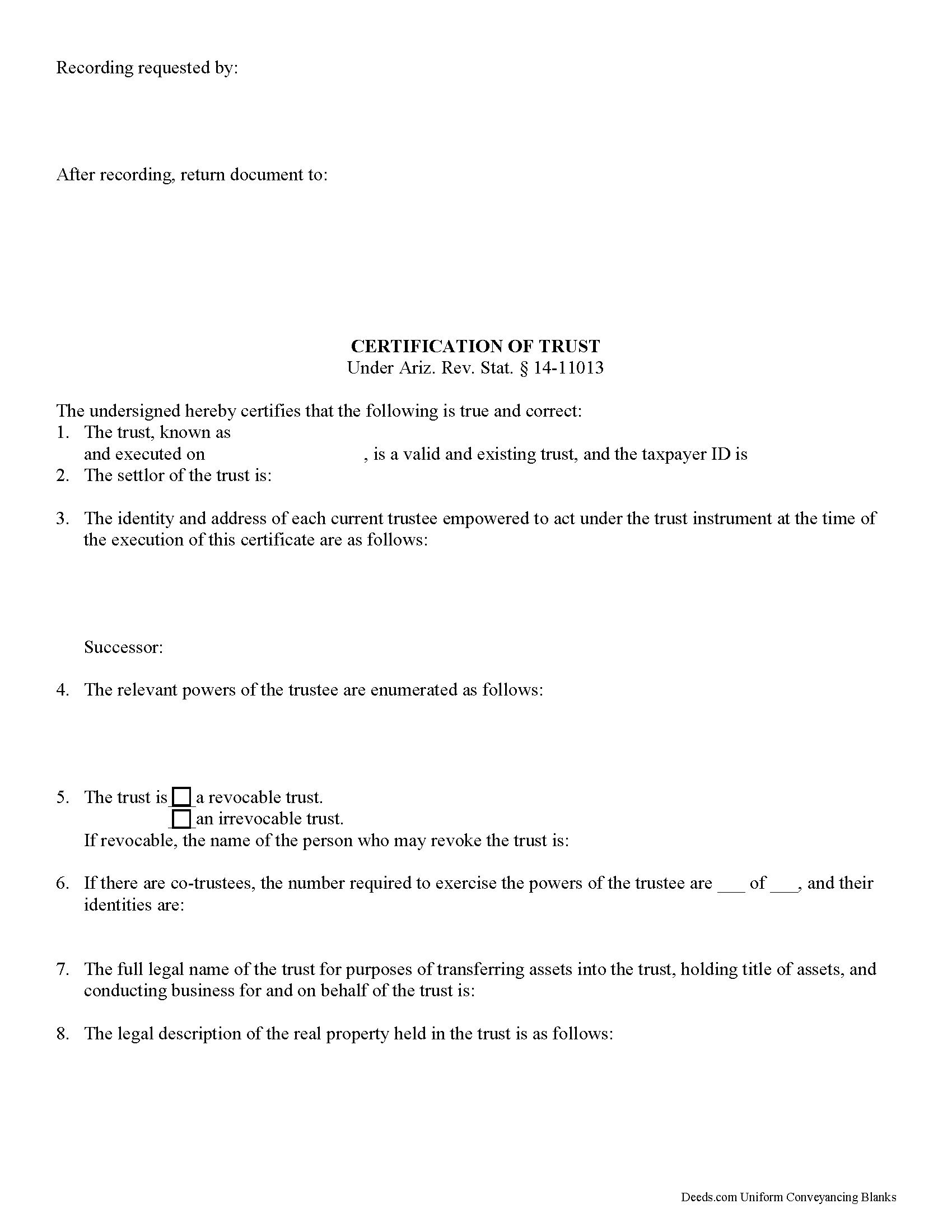
Arizona Rev. Stat. 14-11013 outlines the requirements for a certification of trust in the State of Arizona.
A certificate of trust is used to disclose information about a trust to a person who is not a beneficiary of said trust. This document, an abbreviated version of the original trust, verifies the existence of the trust and the trustee's authority to act on behalf of the trust. It provides the necessary information about the trust while leaving out non-essential personal information.
The trustee is held liable for information presented as fact in the document.
Contact a lawyer with any questions that may arise when preparing a certificate of trust.... More Information about the Arizona Certificate of Trust
Mechanics Lien Written Request for Information
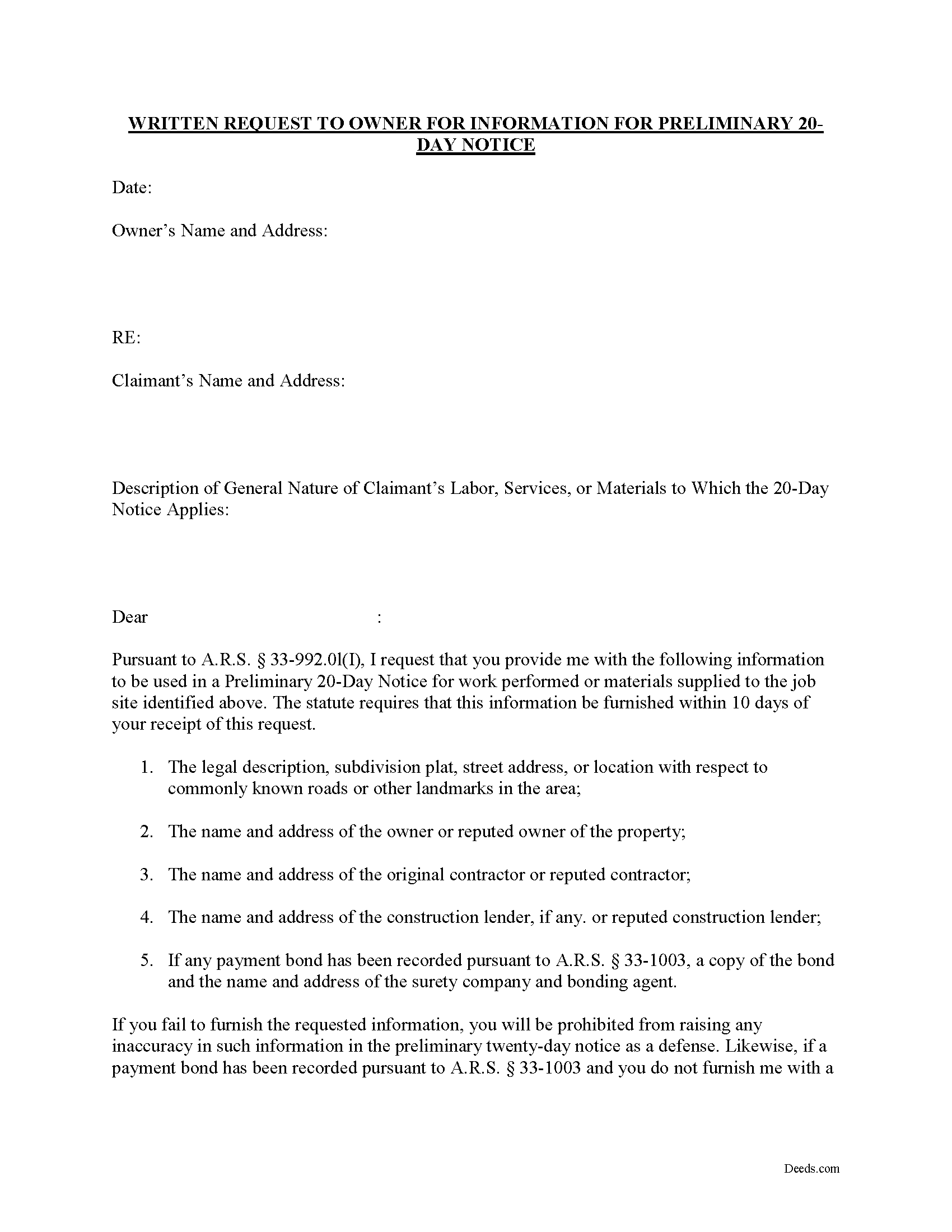
Requesting Information to Draft a Preliminary 20-Day Notice in Arizona
A preliminary 20-day notice in Arizona typically requires information from the owner. Sending an information request form allows the claimant to obtain the necessary details in time to file the preliminary notice.
The property owner must reply within ten days after receiving the written request and furnish a written statement containing the following information pursuant to AZ. REV. STAT. 33-922.01(I):
1. The legal description, subdivision plat, street address or location with respect to commonly known roads or other landmarks in the area, or any other description of the jobsite sufficient for identification.
2. The name and address of the owner or reputed owner.
3. The name and address of the original contractor or reputed contractor.
4. The name and address of the construction lender, if any, or reputed construction lender.
5. If any payment bond has been recorded pursuant to section 33-1003, a copy of the bond and the name and address of the surety company and bonding agent, if any, providing the payment bond.
If the owner or other interested party fails to furnish the requested infor... More Information about the Arizona Mechanics Lien Written Request for Information
Preliminary Notice of Mechanics Lien
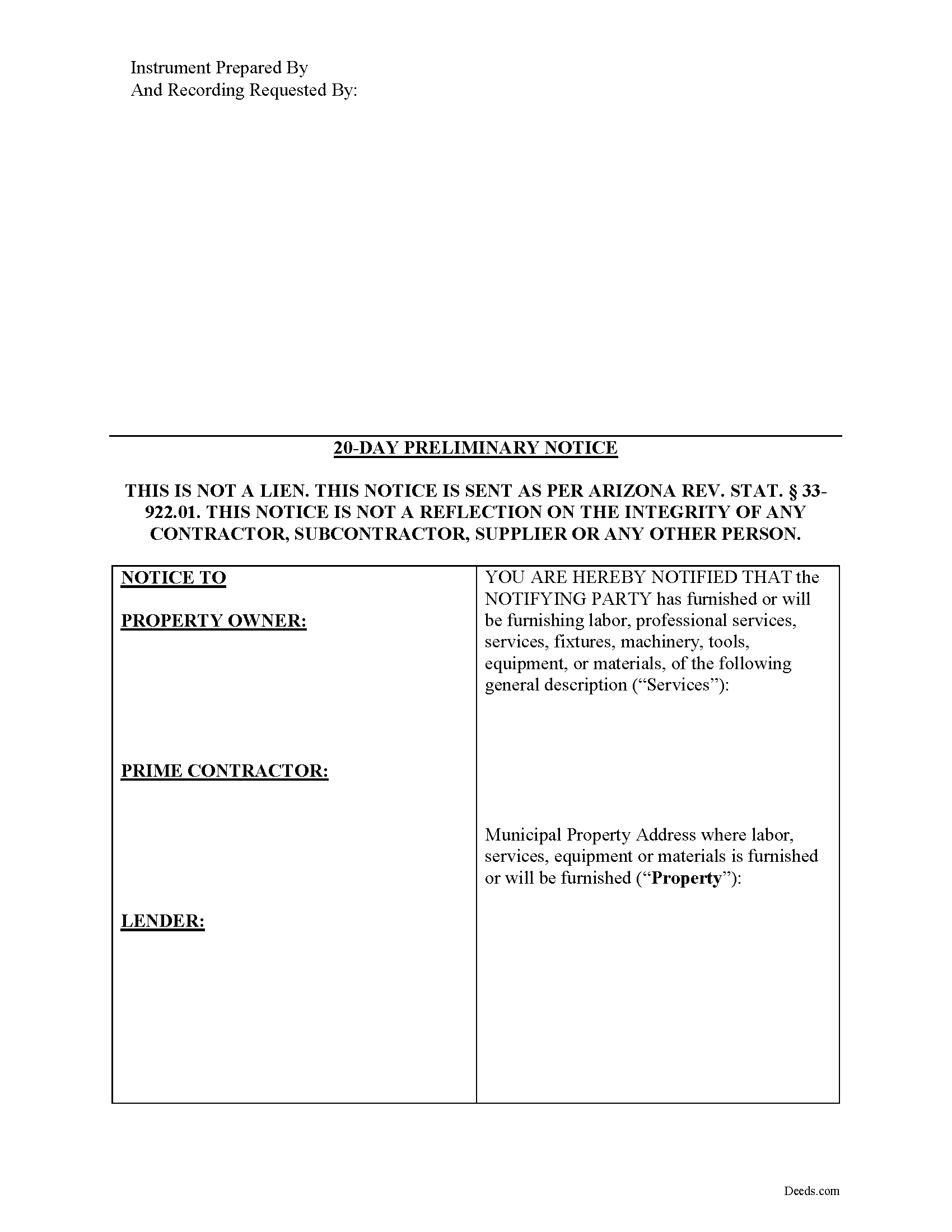
Preliminary Notice in Arizona (20 day notice of mechanic's lien)
As a contractor, subcontractor, or materials or equipment supplier, it's vital to ensure that the property owner receives his or her preliminary (a.k.a. "pre-lien" notice) within the required timeframe. In Arizona, that form of notice (called the "preliminary 20-day notice") must be sent within 20 days after the claimant first furnished labor, professional services, materials, machinery, fixtures, or tools to the jobsite. A.R.S. 33- 922.01(C).
So, who sends the notice in order to claim a later lien? The answer is every person who furnishes labor, professional services, materials, machinery, fixtures or tools, except for a person performing actual labor for wages, must serve the owner or reputed owner, the original contractor or reputed contractor, the construction lender, and the person with whom the claimant has contracted for the purchase of those items with a written preliminary twenty-day notice. A.R.S. 33- 922.01(B). So all parties, besides laborers working for wages, who are involved in a construction job should serve one.
The preliminary notice must contain the following information: (1) a general de... More Information about the Arizona Preliminary Notice of Mechanics Lien
Notice and Claim of Mechanics Lien
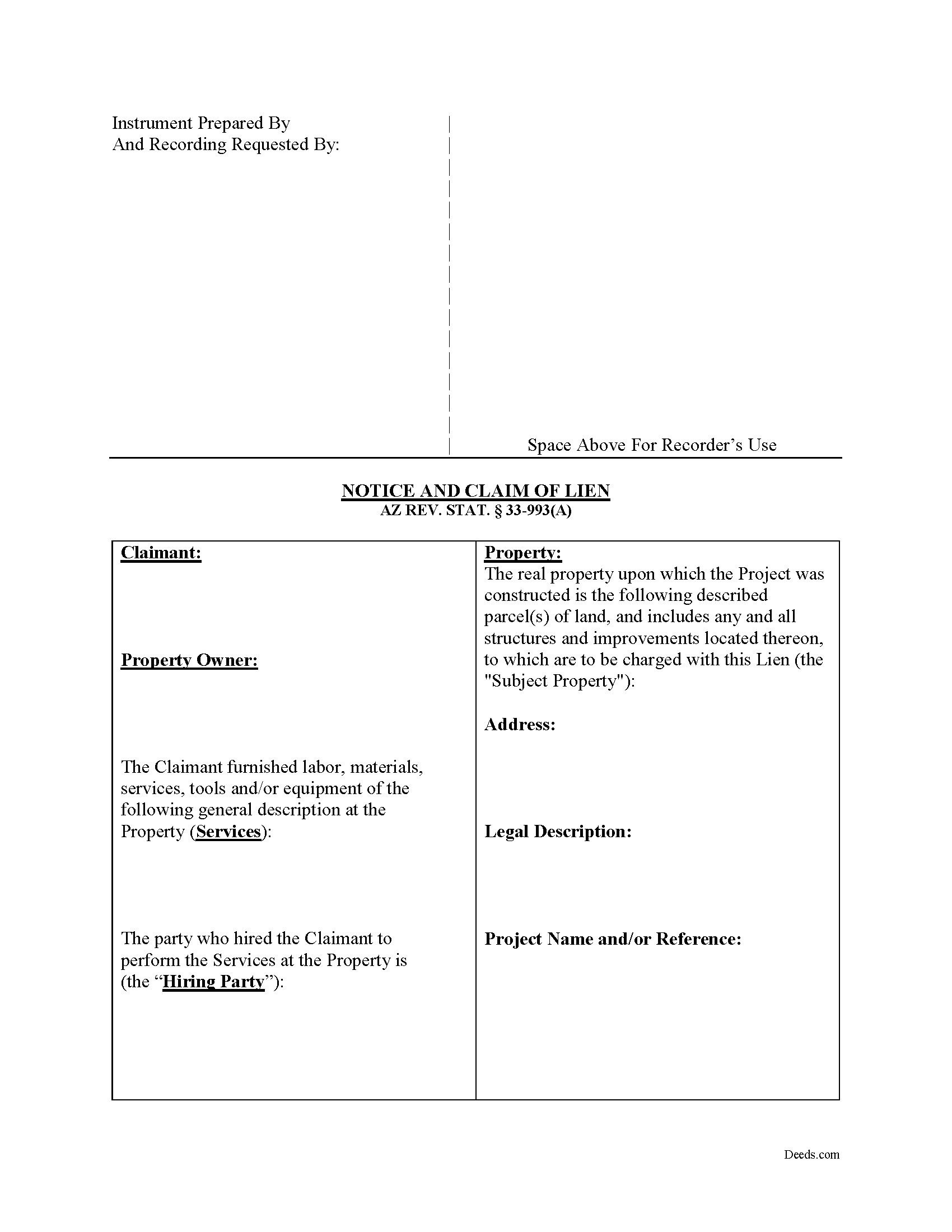
Filing Arizona Mechanic's Liens
A mechanic's lien is a type of property interest that interferes with the owner's rights of possession. In many ways, a lien is like a mortgage and allows the lienholder to foreclose or force a sale of the property to recover the money owed. Mechanic's liens are available in Arizona to every person who labors or furnishes professional services, materials, machinery, fixtures or tools in the construction, alteration or repair of any building, or other structure or improvement. AZ REV. STAT. 33-981(A).
To seek a mechanic's lien, you must comply with the statutory framework which includes first sending a 20-day preliminary notice not later than twenty days after the claimant has first furnished labor, professional services, materials, machinery, fixtures or tools to the jobsite. AZ REV. STAT. 33-992.01(C). If you have sent the required preliminary notice, you must file a Notice and Claim of Lien to record a mechanic's lien. AZ REV. STAT. 33-993(A). The time for recording the lien is measured either by the date of completion or date the owner sends a notice of completion document. Id. If the owner has not sent a notice of completion, the time fo... More Information about the Arizona Notice and Claim of Mechanics Lien
Notice of Intent to Suspend Work
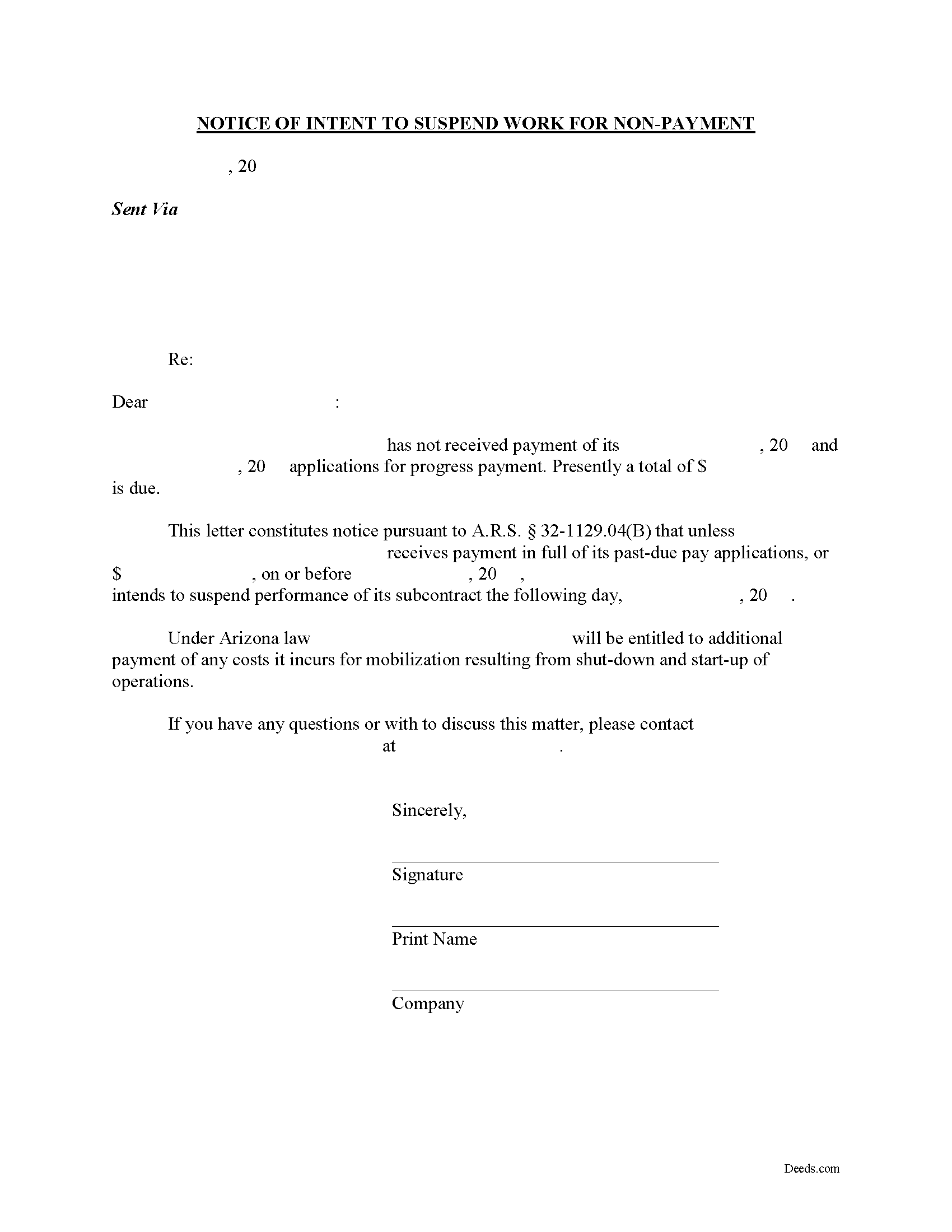
Sending a Notice of Intent to Suspend Work for Non-Payment in Arizona
When a prime contractor or property owner fails to make timely payments on accounts on past-due accounts, one option to encourage payment is sending a notice that all further work will be suspended because of non-payment. In Arizona, contractors can use a Notice of Intent to Suspend Work for Non-Payment for that purpose. The Notice is not a statutory form and thus does not have to be recorded, notarized, or verified like other lien documents. There is also no required format and it can take the appearance of an ordinary business correspondence, but there is a preferred layout in an attempt to streamline the process.
The Notice contains the name and address of the property owner or contractor, first and second missed payment due dates, total amount due, and a date on which work will be suspended if the account remains unpaid. Contact information can also be included if the recipient has any questions or wishes to make further arrangements.
This article is provided for informational purposes only and should not be relied upon as a substitute for the advice of an attorney. If you have any questions about se... More Information about the Arizona Notice of Intent to Suspend Work
Work Stop Notice
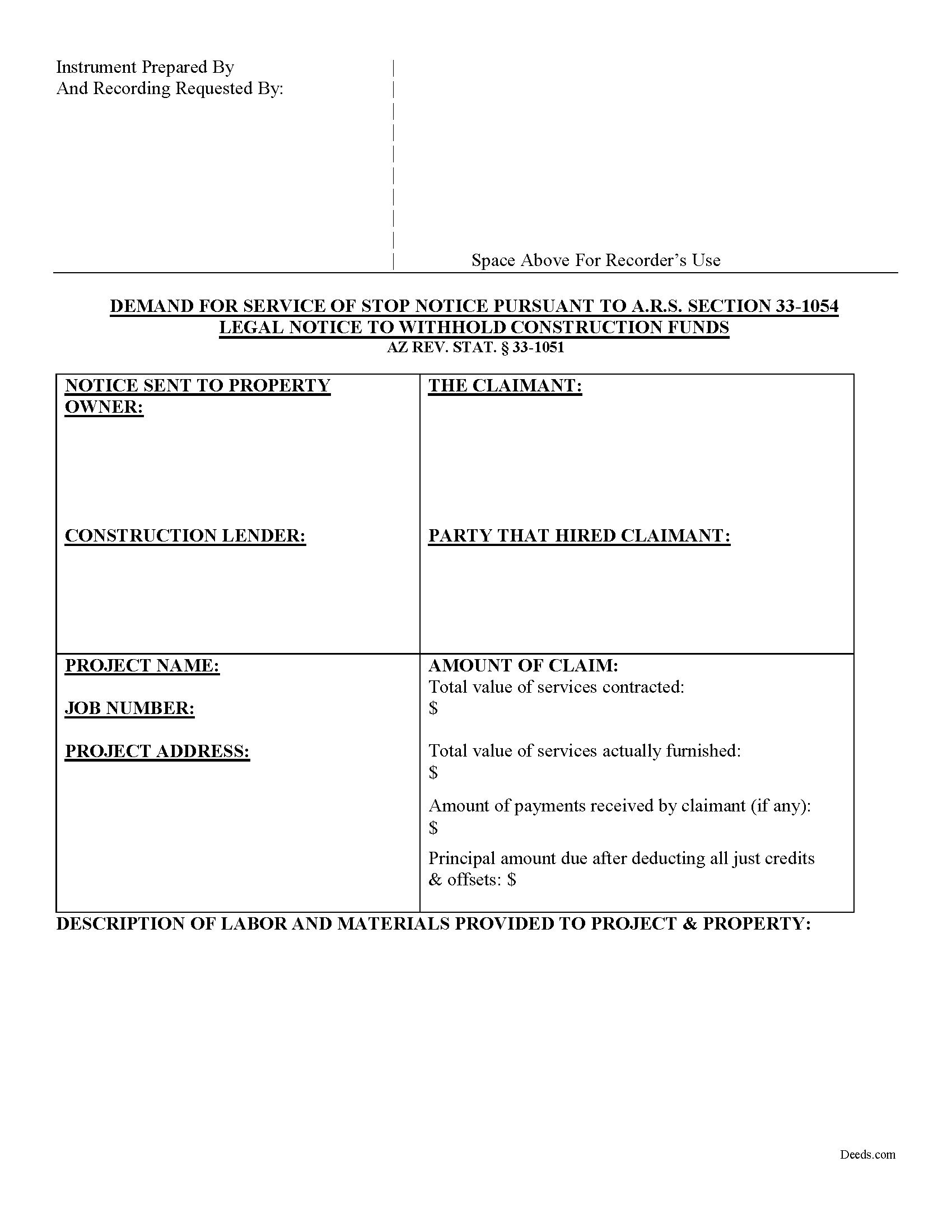
Stop Notices in Arizona
In addition to recording a mechanic's lien, a stop notice is another way to recover the money you are owed on a construction project. A stop notice is a written and verified notice, sent to the owner or construction lender that instructs them to withhold payment of the amounts not yet disbursed in order to satisfy the unpaid claim. AZ REV. STAT. 33-1051(4).
Any person entitled to record a claim of lien, other than the original contractor, may give the owner or lender a stop notice. AZ REV. STAT. 33-1054. However, stop notices are only available on private jobs. AZ REV. STAT. 33-1053. If someone is entitled to give a stop notice and fails to serve it within thirty days after a written demand from the owner, he or she forfeits the right to any stop notice on the work described in the demand. Id. Unlike mechanic's liens, a stop notice is not invalid if the form is defective, as long as it is sufficient to substantially inform the owner of the information required. AZ REV. STAT. 33-1052. There are harsh penalties for falsifying a stop notice. Any person who willfully gives a false stop notice or bonded stop notice or includes in the notice any labor, ... More Information about the Arizona Work Stop Notice
Unconditional Lien Waiver on Progress Payment
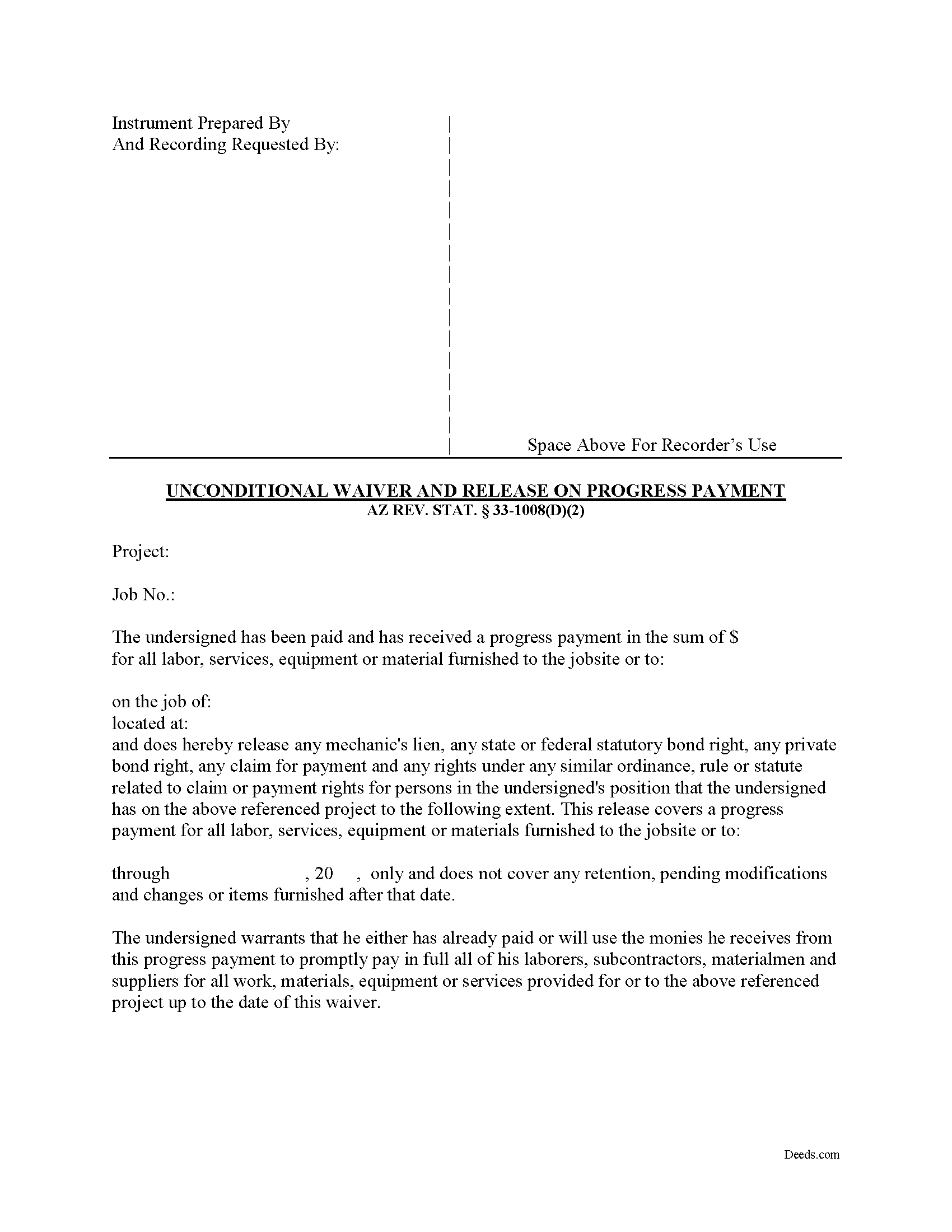
Lien waivers are part of the Arizona mechanic's lien process. The waiver, given by a contractor, subcontractor, materials supplier or other party to the construction project (the claimant) acknowledging receipt of payment and waiving any future lien rights to the owner's property. Lien waivers are governed under Arizona Revised Statute 33-1008.
In Arizona, lien waivers require strict compliance with the statute and any document purported to waive a lien must follow the statutory format. AZ REV. STAT. 33-1008(A). Any contract or other form attempting to waive lien rights is void as a matter of law. Id. Additionally, lien waivers filed in the state require evidence of actual payment when the waiver is conditioned on receipt of payment. Id.
There are two classifications of lien waivers: conditional and unconditional. Within either class, there are subcategories of "partial" and "final" waivers. Unconditional waivers do not require payment confirmation, but conditional waivers are effective only when payment is received, usually verified by a check clearing the bank. So, an unconditional waiver given after a partial payment releases a portion the claimant's right to lien, regar... More Information about the Arizona Unconditional Lien Waiver on Progress Payment
Conditional Lien Waiver on Progress Payment
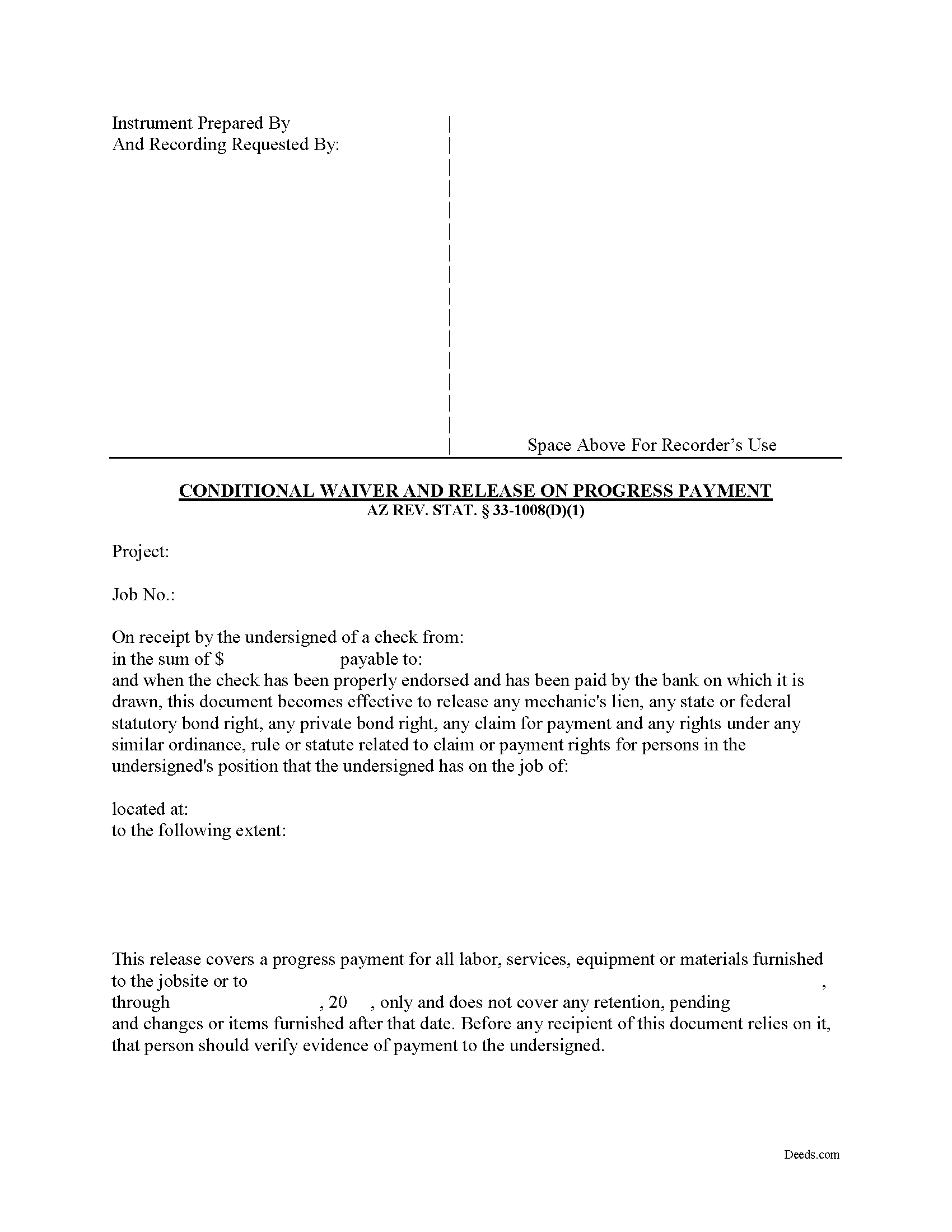
Arizona Conditional Lien Waiver on Progress Payment
Lien waivers are part of the mechanic's lien process. The waiver is a document from a contractor, subcontractor, materials supplier or other party to the construction project (the claimant) acknowledging receipt of payment and waiving any future lien rights to the owner's property. Lien waivers are governed under Arizona Revised Statute 33-1008.
In Arizona, lien waivers require strict compliance with the statute and any document purported to waive a lien must follow the statutory format. AZ REV. STAT. 33-1008(A). Any contract or other form attempting to waive lien rights is void as a matter of law. Id. Additionally, lien waivers filed in the state require evidence of actual payment when the waiver is conditioned on receipt of payment. Id.
There are two classifications of lien waivers: conditional and unconditional. Within either class, there are subcategories of "partial" and "final" waivers. A conditional waiver is effective only when payment is received, usually verified by a check clearing the bank. So, a conditional waiver given after a progress payment releases the claimant's right to lien, up to a specified date, ... More Information about the Arizona Conditional Lien Waiver on Progress Payment
Notice of Completion
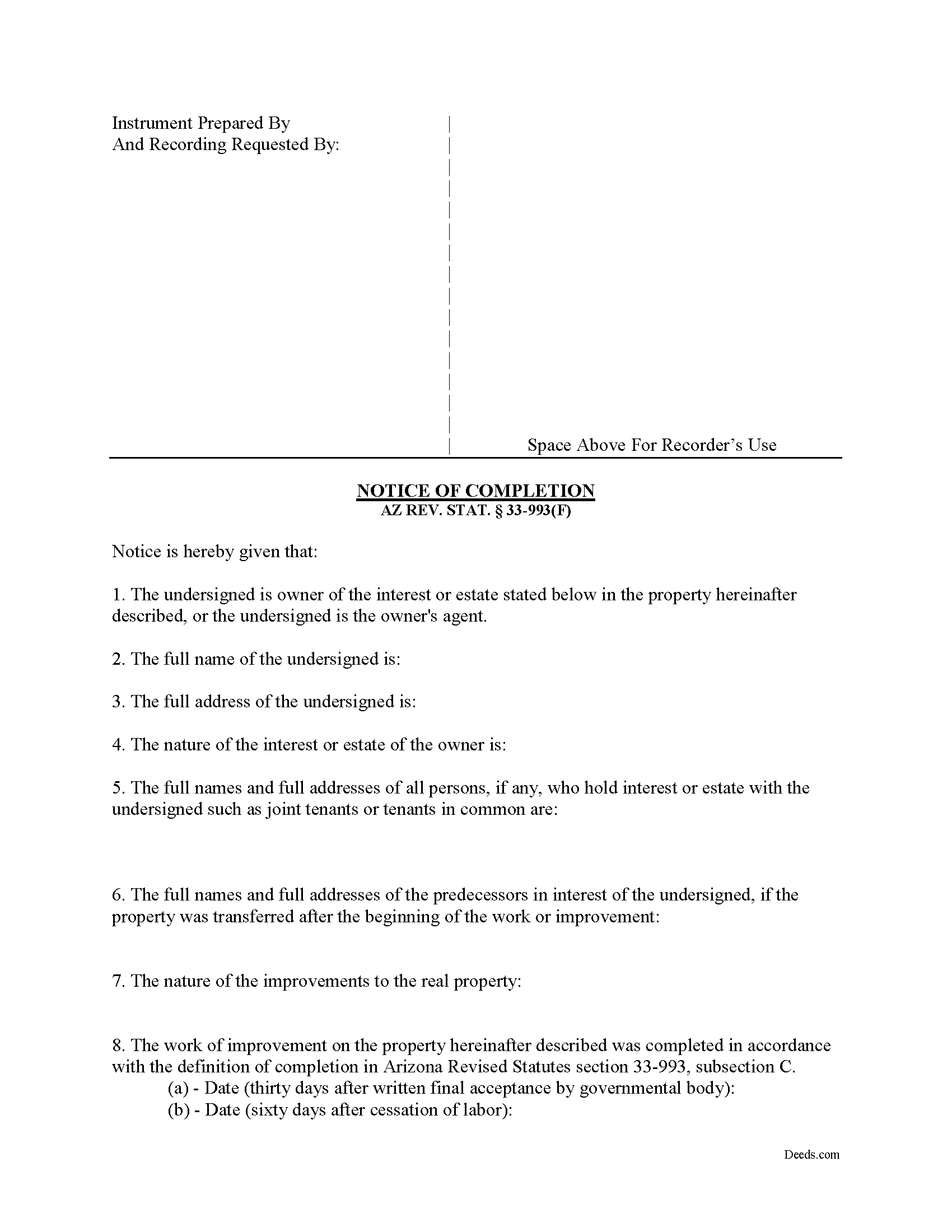
A Notice of Completion is a recorded document used to provide notice to potential lien claimants that the work of improvement on a property has ceased, which in turn prompts the claimants to file their liens within a shorter time period provided by the statute. In Arizona, lien claimants have 120 days to secure a lien after final completion, but filing a notice of completion limits that time to 60 days. AZ REV. STAT. 33-993(A).
In Arizona, "completion" is defined by the earliest occurrence of two events: 1) 30 days after final inspection and written final acceptance by the governmental body which issued the building permit for the building, structure or improvement; or 2) Cessation of labor for a period of sixty consecutive days, except when such cessation of labor is due to a strike, shortage of materials or act of God. AZ REV. STAT. 33-993(C). If no building permit is issued or if the governmental body that issued the building permit for the building, structure or improvement does not issue final inspections and written final acceptances, then "completion" means the last date on which any labor, materials, fixtures, or tools were furnished to the property. AZ REV. STAT. 33-... More Information about the Arizona Notice of Completion
Unconditional Waiver upon Final Payment
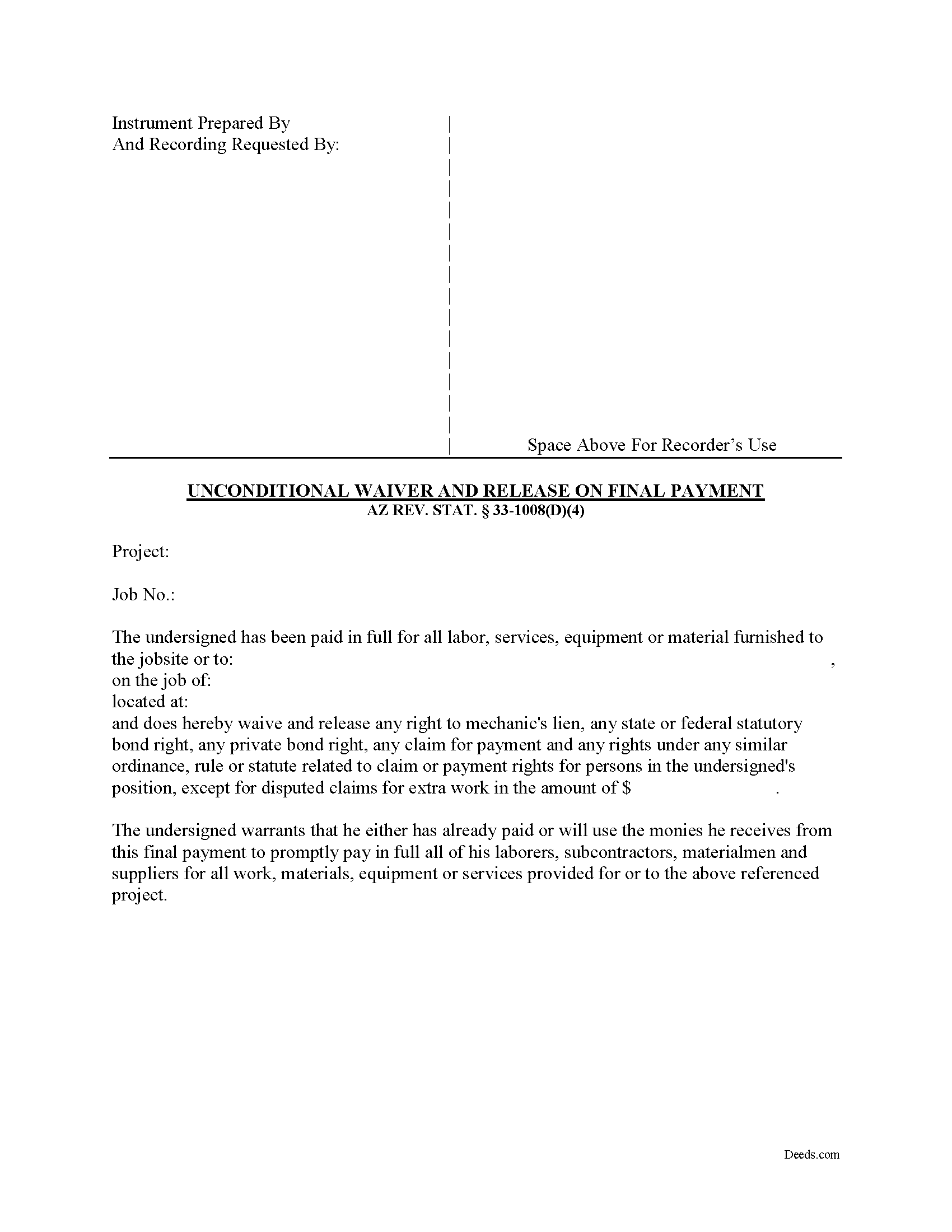
Lien waivers are part of the Arizona mechanic's lien process. The waiver, given by a contractor, subcontractor, materials supplier or other party to the construction project (the claimant) acknowledging receipt of payment and waiving any future lien rights to the owner's property. Lien waivers are governed under Arizona Revised Statute 33-1008.
In Arizona, lien waivers require strict compliance with the statute and any document purported to waive a lien must follow the statutory format. AZ REV. STAT. 33-1008(A). Any contract or other form attempting to waive lien rights is void as a matter of law. Id. Additionally, lien waivers filed in the state require evidence of actual payment when the waiver is conditioned on receipt of payment. Id.
There are two classifications of lien waivers: conditional and unconditional. Within either class, there are subcategories of "partial" and "final" waivers. A conditional waiver is effective only when payment is received, usually verified by a check clearing the bank. So, an unconditional waiver given after the final payment releases the claimant's right to lien, regardless of whether or not any check used to pay the bill clears the bank.
... More Information about the Arizona Unconditional Waiver upon Final Payment
Conditional Lien Waiver on Final Payment
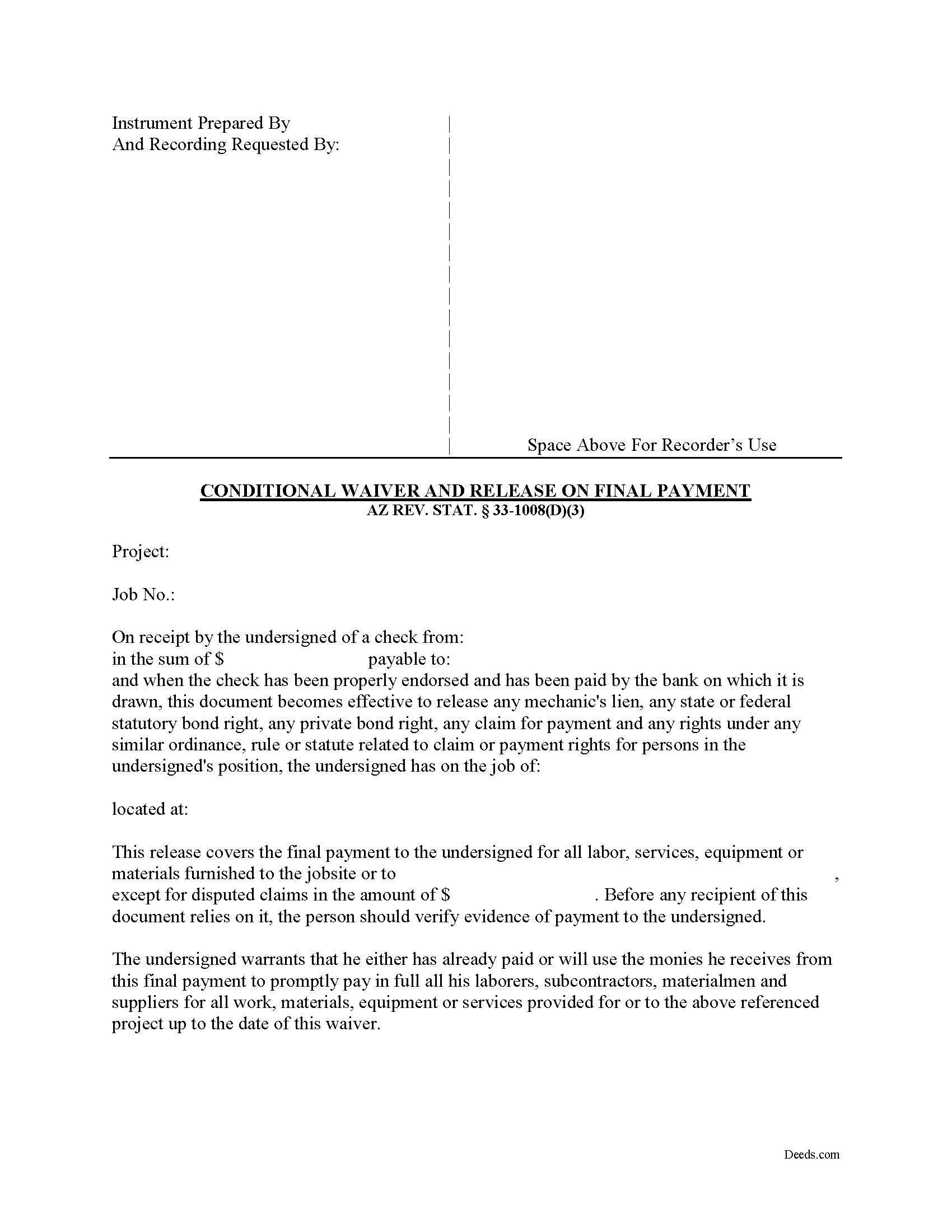
Lien waivers are part of the Arizona mechanic's lien process. The waiver, given by a contractor, subcontractor, materials supplier or other party to the construction project (the claimant) acknowledging receipt of payment and waiving any future lien rights to the owner's property. Lien waivers are governed under Arizona Revised Statute 33-1008.
In Arizona, lien waivers require strict compliance with the statute and any document purported to waive a lien must follow the statutory format. AZ REV. STAT. 33-1008(A). Any contract or other form attempting to waive lien rights is void as a matter of law. Id. Additionally, lien waivers filed in the state require evidence of actual payment when the waiver is conditioned on receipt of payment. Id.
There are two classifications of lien waivers: conditional and unconditional. Within either class, there are subcategories of "partial" and "final" waivers. Unconditional waivers take effect without payment confirmation, but conditional waivers are effective only when payment is received, usually verified by a check clearing the bank. So, a conditional waiver given after the final payment releases the claimant's right to lien, but only afte... More Information about the Arizona Conditional Lien Waiver on Final Payment
Authority to Cancel Notice of Claim of Lien
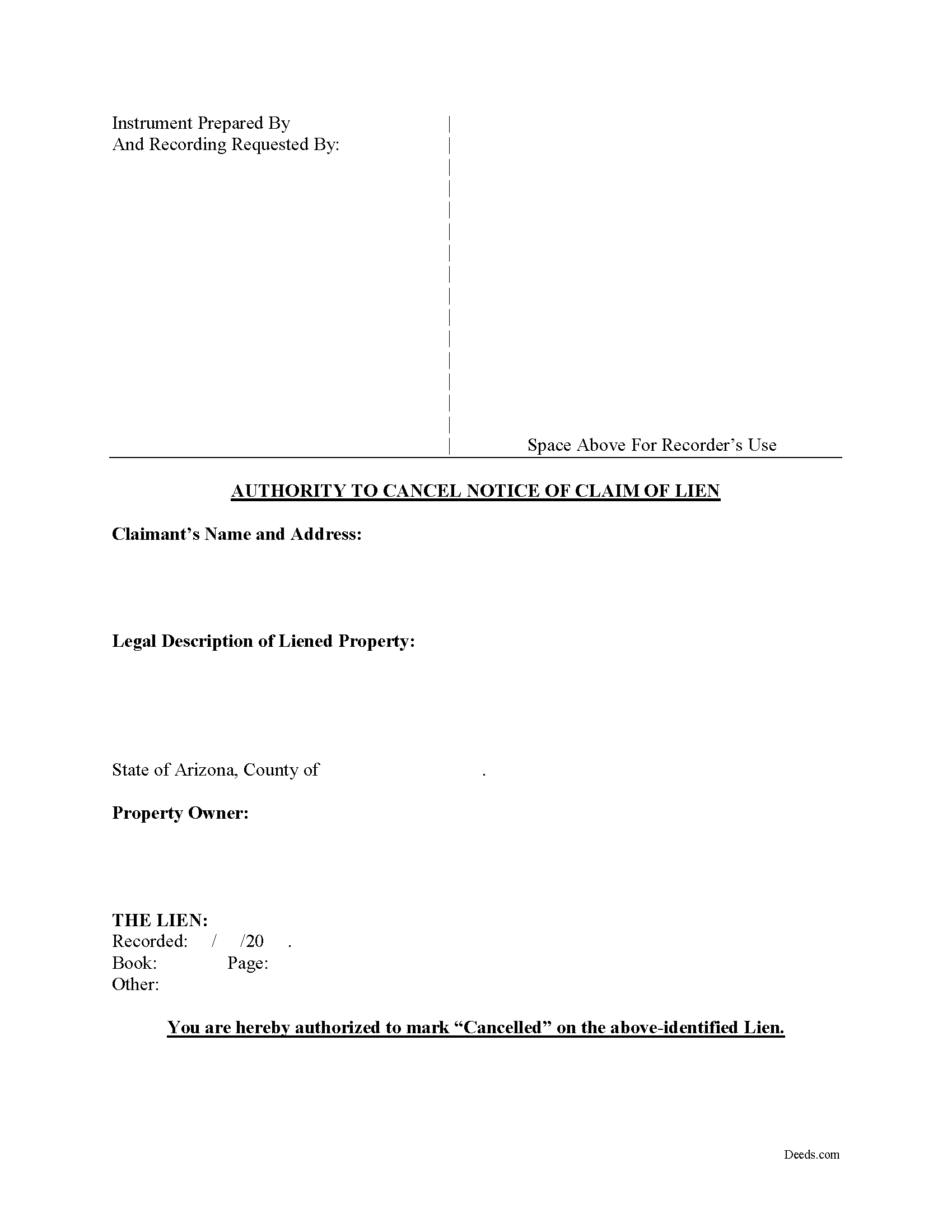
Cancelling a Recorded Lien in Arizona
When a recorded claim of lien is satisfied, the claimant must cancel it within 20 days. AZ REV. STAT. 33-1006(A). Additionally, if a lien prohibited under 33-1002 (against the dwelling of an owner-occupant) has been recorded, the claimant must release than lien within 20 days of a request made by the owner-occupant. AZ REV. STAT. 33-1006(B). Finally, there is a penalty for failure to release the lien within the proper time. Failure to grant a lien release will subject the lienholder to liability of one thousand dollars as well as for actual damages caused by not releasing the lien. AZ REV. STAT. 33-1006(C).
The lien release form is a simple document that identifies the claimant's name and address, description of the property, county, and recording details of the lien (book and page number). By recording the lien cancellation, the county recorder will cancel the previously recorded mechanic's lien.
This article is provided for informational purposes and should not be relied on as a substitute for the advice of an attorney. If you have any questions about cancelling a mechanic's lien, please contact an Arizona attorney.
... More Information about the Arizona Authority to Cancel Notice of Claim of Lien
Lis Pendens
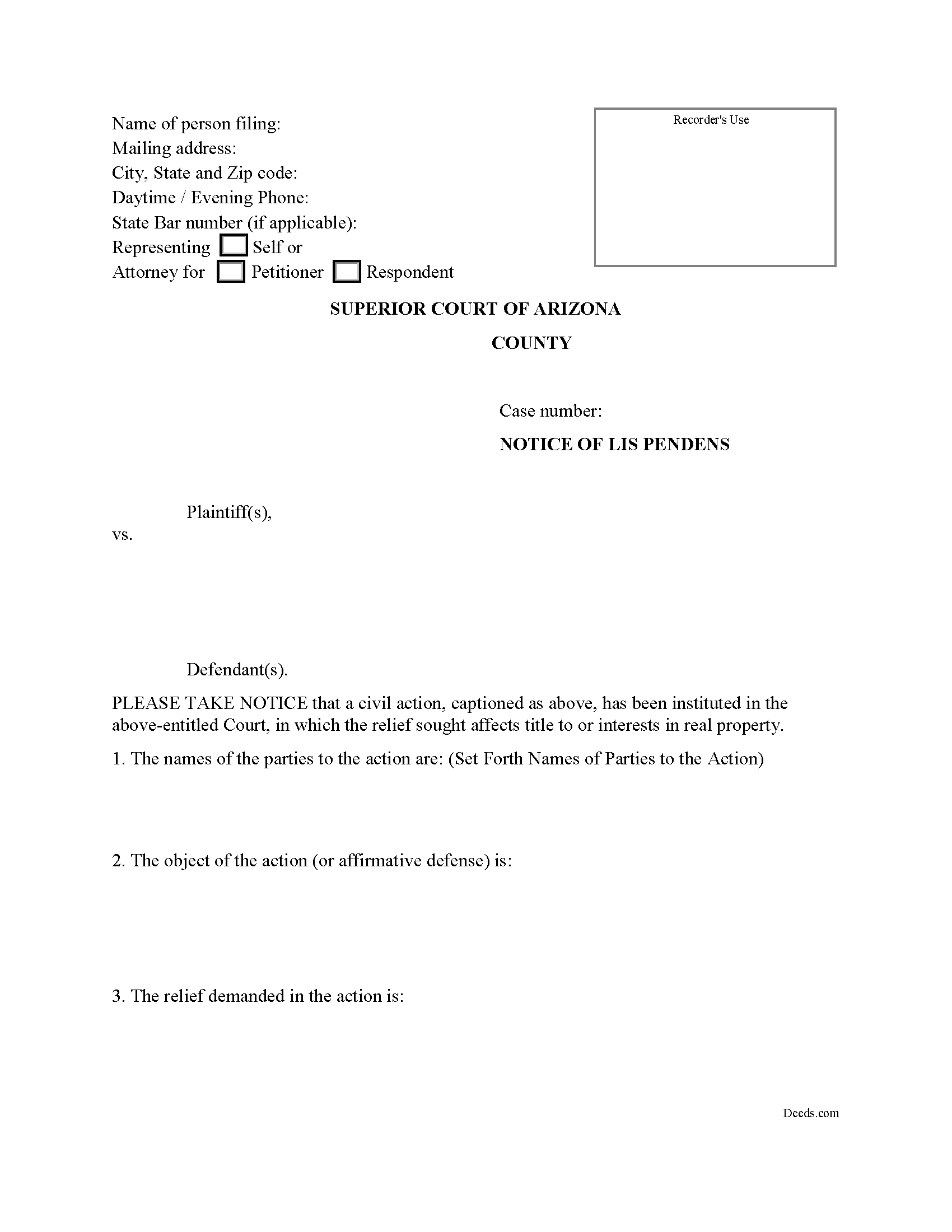
Lis Pendens is Latin, meaning "Suit Pending" In Arizona a Lis Pendens is filed to notify the world that a case/action is pending on a parcel of property. The suit must involve title to the real property. So, if a mechanics lien is filed, should I file a Lis Pendens? No, because it doesn't affect title to real property, After the mechanics lien is adjudicated and a Foreclosure suit begins, then a Lis Pendens should be filed. Sometimes in a divorce, when one spouse solely owns the property. A Lis Pendens is filed to prevent the sale of the house, until the divorce is settled. A Lis Pendens is a very powerful tool, it basically puts a cloud on the title, which makes it very difficult to sell the property, and there are consequences if filed falsely. Without a lawsuit affecting title to real property, you should not file a Lis Pendens.
Formatted to meet Arizona recording requirements with ample space for multiple plaintiffs (person(s) who brings a case against another in a court of law) and defendants.
(Arizona Lis Pendens Package includes form, guidelines, and completed example)... More Information about the Arizona Lis Pendens
Lis Pendens Release
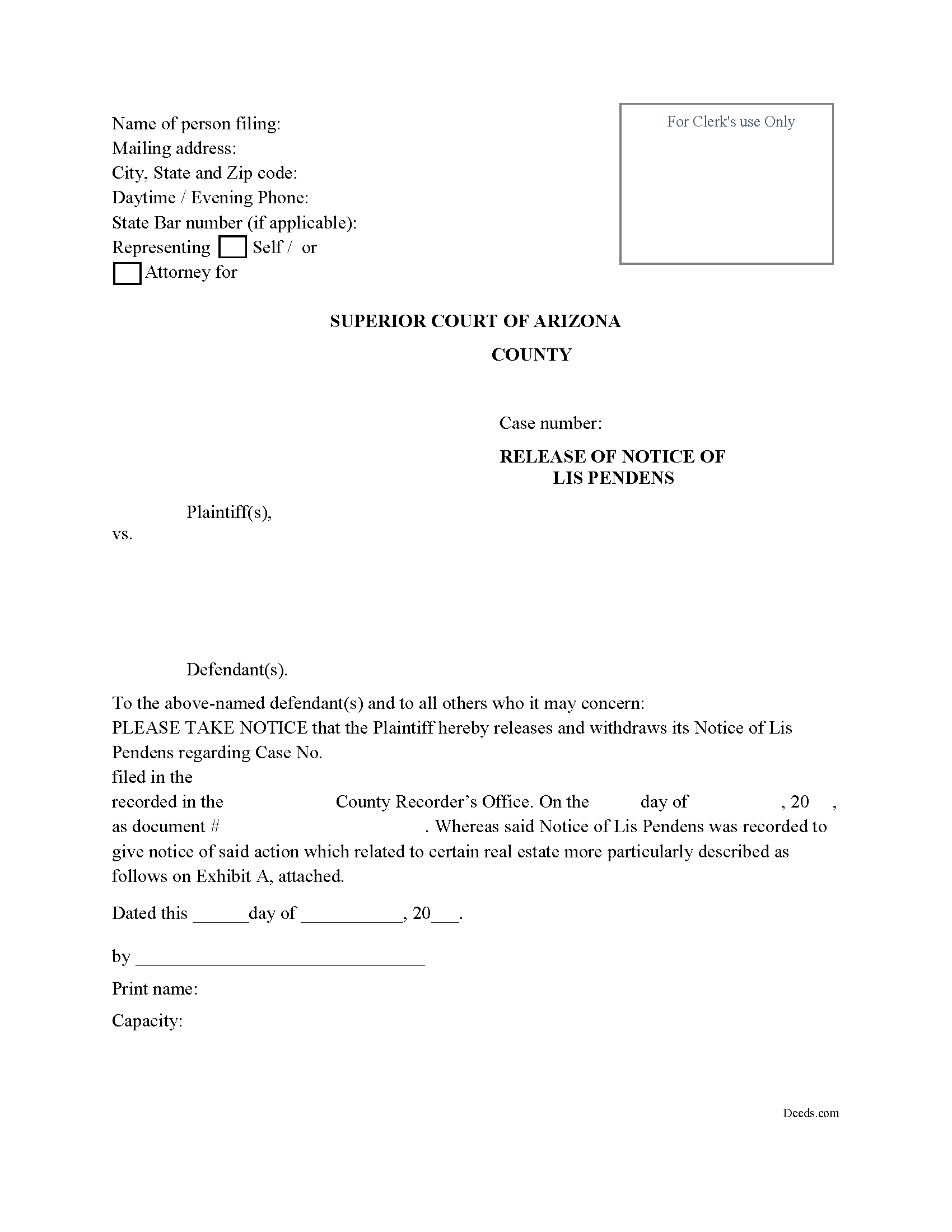
When to use an Arizona Release of Notice of Lis Pendens document.
When a Lis Pendens has been filed and the court dismisses the action, the plaintiff(s) have 30 days to issue a Release of Notice of Pendency. 12-1191(C). If a notice of pendency of action has been recorded pursuant to this section and the action is dismissed without prejudice for lack of prosecution, the plaintiff or plaintiffs of the action, within thirty days after such dismissal, shall issue to the defendant of the action a release of the notice of pendency of action. Such release shall be in the form of a recordable document. Failure to grant such release shall subject the person filing the notice of action or defense to liability in the amount of one thousand dollars and also to liability for actual damages.
Therefore, if a case has been resolved, example plaintiff receives payment for monies owed on work done and settles the case. A Release of Lis Pendens needs to be recorded to prevent further liability. Imagine a buyer backs out of a sale because a Lis Pendens is still recorded on the property giving the image of property under litigation. Damages could be sought.
(Arizona Lis Pendens Release Packa... More Information about the Arizona Lis Pendens Release